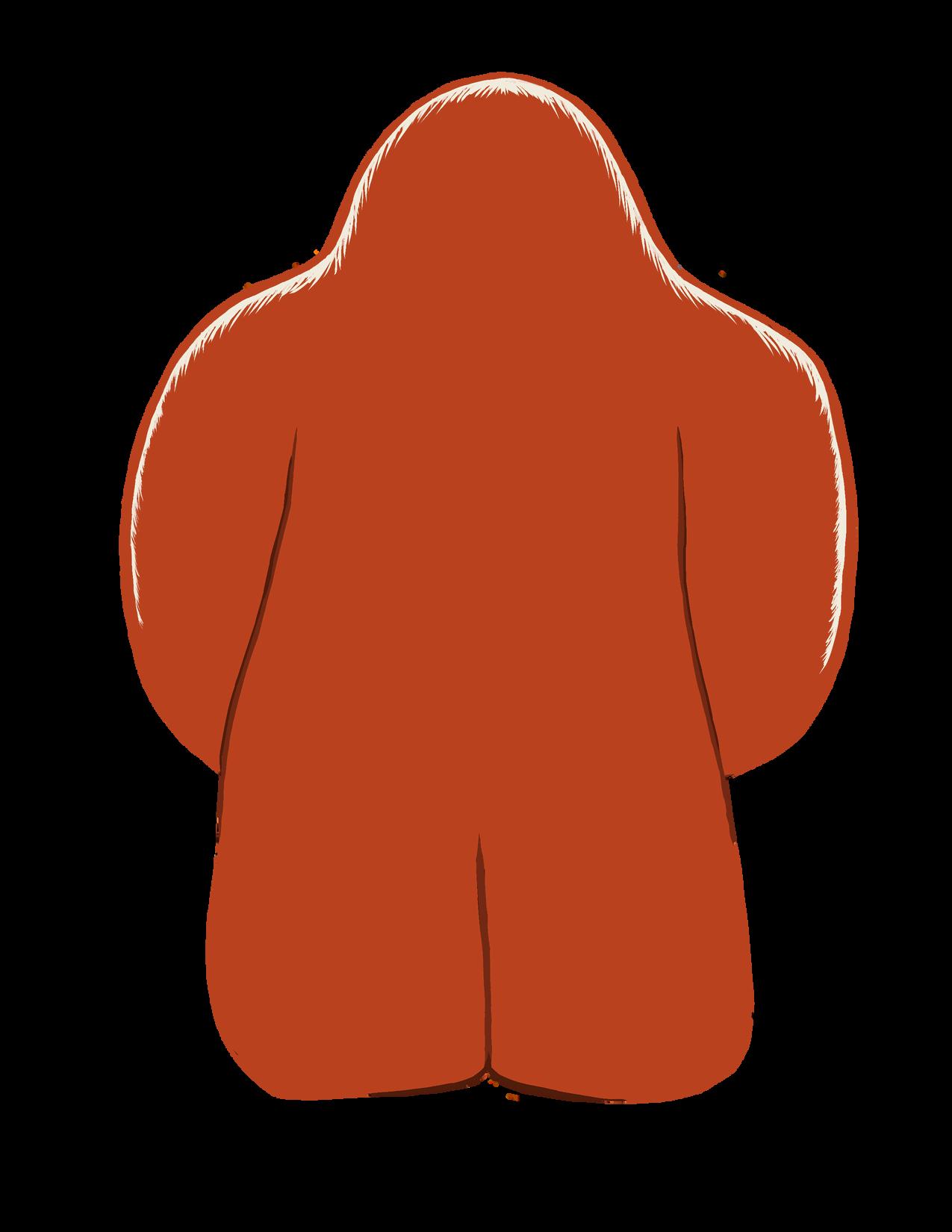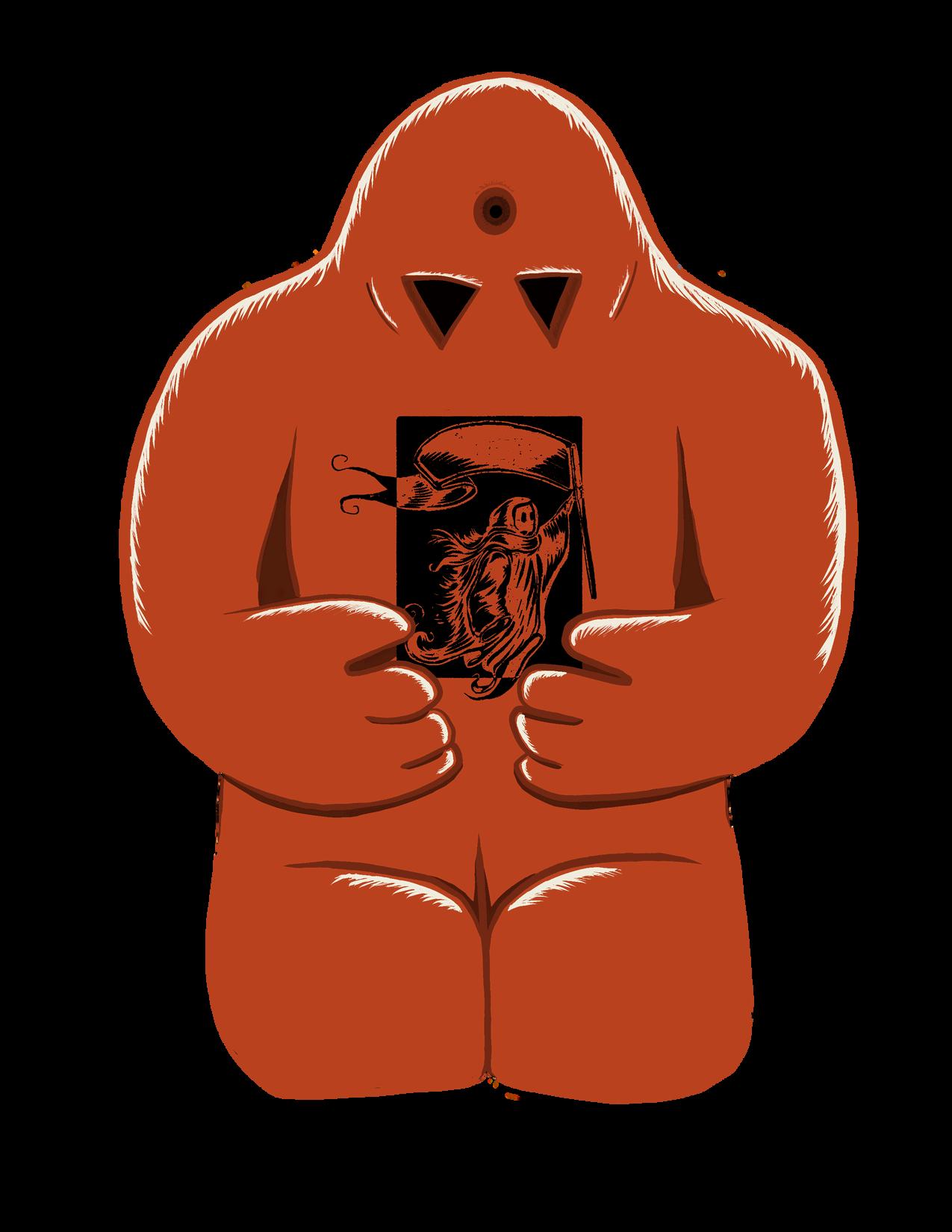
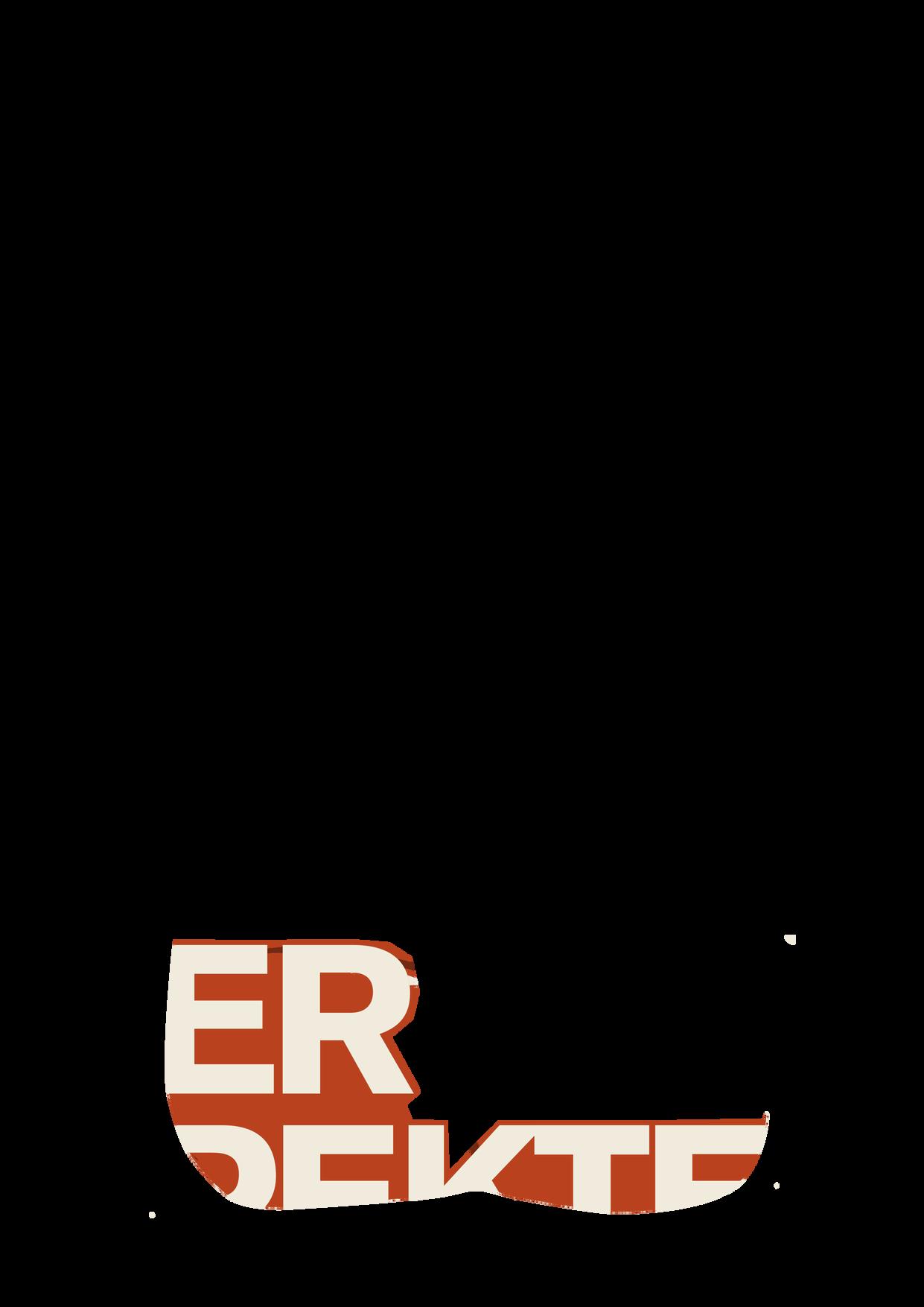
CONTRIBUTORS
NURI
ANITA GALLERS
JOE GRIM FEINBERG SHANTI SINGH
ROSALYN LEBAN
CHAIA YASHA LEVINE
VILNA GOLES
SAM HIRSHBERG
EDITORIAL BOARD
Malka Leah
Alex Lantsberg
Mark Misoshnik
Josh Waletzky




Malka Leah
Alex Lantsberg
Mark Misoshnik
Josh Waletzky

One year ago, a small group of diasporist Jews came together to spearhead a new Bundist literary arm, like the many that existed at the height of the Bund in the 20th century Der Spekter, we decided, would be fully independent from the International Jewish Labor Bund itself so as to maintain editorial independence and efficiency. We are immensely proud of the unique space we have created to help uplift progressive visions for a Judaism beyond nationalism and capitalism. We have shared music, poetry, interviews, original essays and reporting, original Yiddish translations, and historical Bundist content that reads as if it could have been written yesterday
But the revival of the Bund is not just an idea we are writing about in this magazine As we have shown through our recurring “Diaspora Dispatches,” local Bund chapters are active in the U S and in Europe and are confronting the challenges listed above. We are impressed by the work of local Bund chapters, whose organizing is specifically being initiated within a framework grounded in the Bund’s pillars of doikayt, khavershaaft, and Yiddishkeit through their own activist leadership, solidarity campaigns, and cultural events, and should serve as inspiration for future Bundists around the world, as well as for the growing Jewish left in general
This is a surreal moment for us, and we are incredibly grateful for the continued support in this endeavor We would also like to take a moment to thank all of our contributors for their excellent work over the past year, plenty of which you will see in this digital magazine It has been immensely humbling and gratifying to be entrusted with publishing so many beautiful, devastating, personal, and moving pieces. We hope you will continue supporting us by contributing your work to Der Spekter or making a donation
Our home is in the multi-varied communities that we’ve built in the diaspora, in solidarity with the oppressed, and with full recognition of our Jewish histories and identities We look forward to continuing to play a part in writing a new Jewish future
In khavershaft,
THE EDITORS
Rosalyn Leban
Although the Purim season has passed and Passover is nearly upon us, the Purim story continues to cast a shadow on both American Jewish life and the transformations roiling American society. Leftist Jews have long struggled with Purim There's a lot to love about a holiday that joyfully smashes gender roles, but it's harder to appreciate exalting the genocide of 75,000 civilians. We've dealt with this in many ways: some have given up celebrating Purim altogether (if they ever celebrated it), while others have "engaged in play" to perform alternative stories
This year, Christian Zionists have further complicated the holiday by appropriating the Jewish heroine of Purim in Project Esther, an authoritarian plan to "combat antisemitism " The right-wing strategy weaponizes Jewish suffering from Shushan to Germany and beyond to entrench U S hegemony and white supremacy And it places the burden for pushing back squarely on the shoulders of the Jews whose history it tries to misuse
Project Esther’s philosemitism, its performative care for Jews, instrumentalizes Jewish identity and serves as a smokescreen to distract from the rampant spread of Nazi iconography and antisemitic ideology among conservatives. This strategy predates and extends beyond Project Esther. While Project Esther is not official U S government policy, the Trump administration’s actions follow its framework closely The Heritage
Foundation invents a “Hamas Support Network” (HSN) made up of “Hamas Support Organizations” (HSOs), which include Students for Justice in Palestine and Jewish Voice for Peace, and calls for “foreign members of HSOs/HSN” to be denied access to school campuses. On Jan. 30, the Trump administration issued an executive order to “combat antisemitism,” which mandated the investigation and punishment of “anti-Jewish racism in leftist, anti-American colleges and universities,” which included “the removal of resident aliens who violate our laws ” Shortly after, immigration agents detained Columbia student Mahmoud Khalil, deported Dr. Rasha Alawieh, and disappeared other dissenters
The Heritage Foundation’s means should feel deeply familiar to leftists, Jews, and especially leftist Jews In labeling as terrorists all who organize for Palestinian liberation, the strategy recalls the McCarthy era, during which the federal government characterized Jews as un-American to justify state violence, including deportation, arrest, and execution. In this iteration of state repression, however, Jews represent American values as long as we can be used to justify U S power Those who speak out against imperialism are “antisemitic, anti-Israel, and antiAmerican,” according to Project Esther and its adherents, even when those people are Jewish U S citizens offering only mild critiques, as when Chuck Schumer called for Israel’s Prime Minister Netanyahu
to resign and was in turn said by Trump to be “not Jewish anymore” and “a Palestinian ” Similarly, Project Esther derides Bernie Sanders’s support of Palestine and criticism of Israel as “inexplicable.” Project Esther takes advantage of this conditional inclusion when it calls to “ensure the security and prosperity of all Americans” while denying those who hold certain viewpoints “access to U.S. open society ” The message is clear: this document’s right-wing architects will protect Jews only as long as we serve their narrative, and the only Jews worthy of protection are those who pledge loyalty to their right-wing program
Similarly, Trump’s executive orders affirming the use of the reductive IHRA definition of antisemitism which was first implemented by Trump in 2019 claims that the federal government will “protect Jewish people to the same extent to which all other American citizens are protected” under Title VI of the Civil Rights Act Title VI prohibits discrimination against people –citizens and noncitizens – based on race, color, or national origin But under Trump, ICE violates Title VI constantly, arresting and terrorizing people based on perceived race The “protection” Trump offers is worthless as his administration openly violates the law he claims will protect us.
You can read the full essay here.
Grim Feinberg
1
Ofcourse, Ireallyappreciate theconcernyoushowedforme Thetimewespenttogetherinthe desert wasspecial. Iwillneverforgetit Butwhythisjealousyandwrath? Yes,it’strue, whenyouwereaway onbusiness, Ididseeothergods. Butdoyouwantmetobelieve thatyouneverledanotherpeople toliberation?
2
Ihungonyoureveryword whenyourebelledagainstthe pantheon Imarched withyourarmyofmisfits whenitsmashedthemawofMoloch andthestonyLordsofCanaan’s shores
ButIleftyou whenyoutookforyourselfthecrown Imighthavelovedyou, Isaid, butIrefusetofearyou. Whenthere’sonetrueGod, Isaid, I’llchoosethemanyfalse EveryTempleyoubuild, Isaid, I’llburyinidols
Butwhenyou’recastofffromyour throne andwanderagaininthedesert, lookformethen
WhenanothergodisLord, Iwon’thesitate tomakeofyou myfalseandtreacherousidol. I’llcarveitwell, sothatallmayseeyou, younganddashing asyouwere whenwefirstmet
3
OnewouldthinkIhardly knewyou Inallourtimetogether youneverletmespeak yourname
ButIdon’tcare Wewerestrangerswhenwemet andstrangerswhenweparted, andifwepasseachother inthestreets incomingyears, I’llhailyou withoutwords
It’strue, Ifoundyouout. Iaskedaround Butreally Idon’tcaresomuchfornames Thelordsandkingsandsonsof sons ofsonsofsons acrossthecenturies, Ican’tkeepthemstraight.
If,intheheatofanger andthedrunkennessofnight, youhearmecalling, youmaytakeitasacompliment Buttruthbetold, Iwasn’ttalkingtoyou.
WhenImeantospeaktoyou I’llcallyou sister,brother,comrade Answermethen Allothernamesarevain
4
We’llmeetsomeFridayevening, sipsweetwine, andI’lltellyou tospendthenight becauseit’stoofar foryoutogobackhome andanywaynextmorning you’vegotnowheretobe, andwhenthesweetness ofthethird orfifth orseventhglass poursoveryourtongue, you’llstarttotellme itwasallyourplan
Howlongagoyouluredme intoyourgarden asanhonoredguest andsentmetoyourfields totillthem withmyhands andwaterthem withmysweat. AllbecauseIwanted toknow andsee thenaked,buxomworld likeyou Iwantedtotaste, yougavemedirt. Iwantedtofuck, yougavemeaplow Butthen, whenIwanteditalltoend, yougaveme adayofrest.
Isaid,backthen Icouldn’tseeyourface Iheardyourvoice, butnowit’schanged Ididn’tknow thatitwasyou!
Isaid,I’lltakeit, yourdayofrest, ononecondition: writebackintoyourbook thechapteryou’veomitted Tellus ofthestrike thatforcedmanagement’shands. Tellus ofthefarmhands wholaiddowntheirtools andtookforthemselves thedayyouclaim asyours Tellus ofthedelegation thatmarchedtoyouroffice toaddtheirdemand toyourcommands
Iadmit mymemory’salittlefoggy, butreally, wouldrefugeesfromparadise, hungeringtobelikegods, turnthemselvestoslaves withoutafight?
Youlaugh andsay let’sgotobed. Inthemorning, aswelietogether andtherestlessworld goesby, Isay,I’lltakeit, butononemorecondition: onedayisnotenough.
5 Yearslater, Iheard youhadason Iwon’tbelieveit Slander! You,anorphangod, madeusasorphans Wehavenoonebutus whosefortunewecanclaim. Sotellme then, whatfatherandwhatmother shouldIhonor? Therib? Themud? I’dratherpayrespects toall thesistersandthebrothers whocomebetween thedust anddust
6 Yes, Iwasupset afterall youputusthrough, whenIhadthoughtwehad ifnotacovenant,then atleastanunderstanding. Attimestherage withinme welledup lookingforasacrifice butdon’tyouworry. Ifoundnone. Asarule Idonotkill butonlyraisemyhands againstimmortals
7
Whymustyou, alwaysstakingoutyourclaims, besetbyjealousy, makemeninyourimage? Please lendmetoanothergod tomakeofmeadifferentman
Willyouletmegotothem whoboretheirchests anddanced tomakeinfertiledesertsflood, orthemwhotiredoftheheavens andtheangels andcame towalkamongthelonely andtherakesandtramps?
Orwillyoufindforme agodonearth likeher,thewoman onmyneighbor’sterrace? Shespoketome theotherday withwordsassharp, andeyesasquick, andheartasloud andskinasbright asallthethunderbolts you’veever thrown She’staken? Idon’tcare, justintroduceus,beafriend. Andaskher,willyou, whichgodishers?
Thencome andseekme inhertemple inthemorning, wakemeup andbringmehome.
8
Butwhatdoyouexpectofme?
Youdemandedforyourself, indesertmisery, atentoffine-twinedyarn, sweetincense andonyxstones, achestperchedonbyangels paymentfromapeople stillmourning theirlostcalf, stillhuddlingunder yourdefenders’swords, stillhungering forhoney andthirstingformilk andwater
Youaskme,then, tomarvelatitall, butyoutellme nottotake evenastoneortwo toshareamong theconquered?
9 Don’ttryme withyourtalk ofpettytheft andstolenglances Iwasatthescene oftherealcrime. Isawthemillionstaken intheirhuts andcamps underanendlessnight Isawthebodiessplit byflyingwordsandteethandknives andleftlikelitter onthesinkingground.
Atdawn Iheardthevoices pretendingsurprise, roundingupthedrifters andthebeggars andthelonely. ButIhadseentheperpetrators’ faces inthelightoffadinglamps andwaningmoons
Theyweremyneighbors shoutinghightheiroathstotruth. Iwillbearwitness, butbeware: I’vegivenmytruth already tothestrangers
YesI, astrangerinthecountry, envymyneighbor Icovethislargehouse builtoveryears ontheprofitsofhisland andthelaborsofhisslaves. Don’tworry, Iwon’ttakeitformyown Ionlywanttostealinside whenhe’saway, topressmyfingers tohissteamingbread andtouchmytongue tohiscoldwine andsetfree allhisslaves andmakelove tohiswife, whogazesdown, herplaitedtressesresting onsoftbread andbreath thatwhispers lettersredaswine eachtime Ipassbeneathherwindow
Thistime shetossedmedown thekey
Yes! Iwantandwant andwant andwon’tagree evertobesatisfied)
Thegatesflyopen, butsheisn’thome Igolookingforhereverywhere untilIhearhercallingfromabove, andupIclimb
Sheerectsmystoneonthe mountaintop, engravedwithhercommands, andIdon’tcare thestonewillshatter whenwerolldowntogether Thetabletsstrewnaround inpieces, she’llrewriteitall directlyonmyskin, andthethunderings andlightnings andthesoundingofthehorn andthesmokethatrises fromourpeaks willmark ourbrittlecovenant thatbreaks andmakesitself aneweachday
Shepromisednothing, andthatiswhyIfollowedher. Wewandered throughforsakenlands ◈
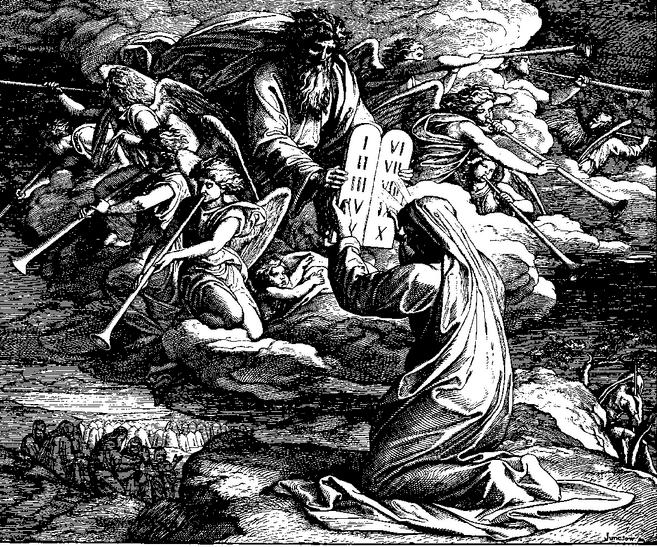
American Jewish artist Julie Weitz embodies the Yiddish folklore figure of the dybbuk to exorcise pain from sites of ancestral trauma The Yiddish reads, "Wherever we live, that's our homeland."
(Photo by
Magda Chudzik)
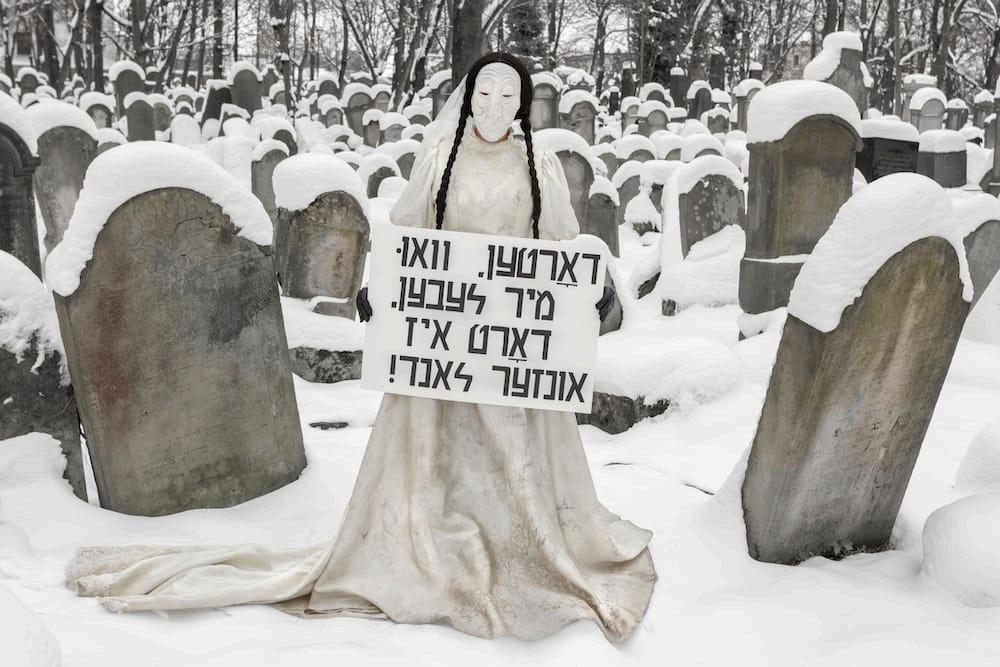

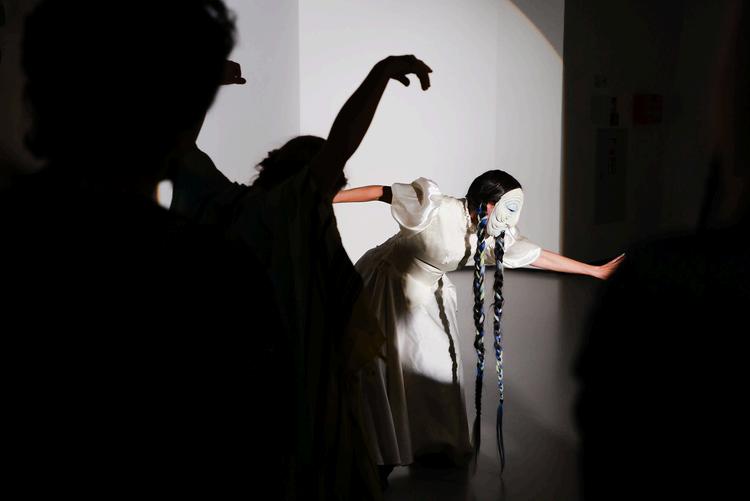

What do the ghosts of history have to teach us about healing from the traumas of our future? This is a question I have asked myself since I arrived in Poland in early September 2023 as a U S Fulbright scholar I came here to research the cultural history of the dybbuk folktale in Poland and develop a collaborative performance art project.
In Yiddish folklore tradition, the dybbuk is a wandering spirit that clings to a living body to communicate messages from the dead. During the interwar period in Poland, the dybbuk gained widespread attention after the folktale was adapted into a play by S Anski and produced by multiple theaters in Warsaw Two years before the Nazi occupation of Poland, the play was turned into a Yiddish-language film by Michal Waszynski, which is widely considered to be the most important Yiddish film ever made "Der Dibuk" featured original choreography by Jewish performers Judith Berg and Felix Fibich, who fled Warsaw at the start of the Nazi occupation in 1939.
Almost a century later, I am picking up where these great Polish Jewish artists left off by returning to the lands of my ancestors to stage a collaborative performance art project inspired by the dybbuk. My work probes the potential for embodied performance art to activate concepts of diasporism and doikayt.
Through my performance art practice, I animate figures from Yiddish folklore and use the interactions between figures and sites especially those where Yiddish culture was all but eradicated to explore themes of loss and healing through a diasporic lens. I engage with caricature, folklorism, and emplacement to historicize my work in relation to past, present, and future developments in Jewish culture
On June 30th, 2024, I premiered Holy Names for Our Dybbuk, a ritual performance of a dybbuk exorcism at the former site of a concentration camp in Kraków, Poland, during the 8th annual FestivALT I worked with an incredible ensemble of Polish dancers and the Polish choreographer Magdalena Przybysz to reimagine a dybbuk exorcism for our times as a movement-based score and site-specific ritual. Embodying the dybbuk, I became a channel for ancestral grief as an ensemble of dancers performed as the healers Through rhythmic movement and chanting, we created a somatic and symbolic ritual to exorcize ancestral trauma from both the body and the land.
Working across performance, film, installation, and photography, Julie Weitz accounts for the wounds and resilience of diasporic culture by creating embodied and collective experiences for repair.
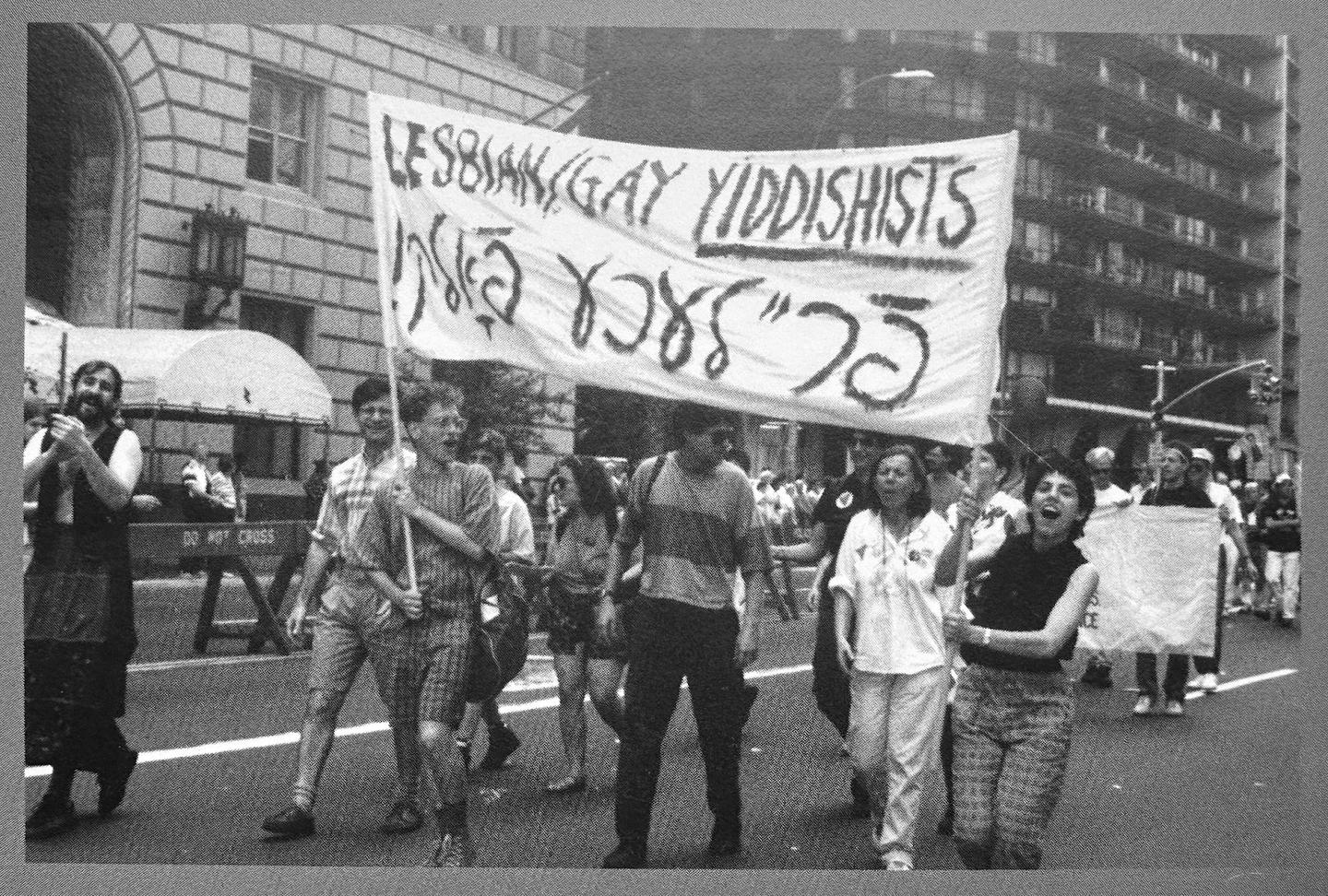
How do you resurrect a global movement that was nearly destroyed by genocide, fascism, and the wheels of time? And how do you continue that movement when so much has changed since its heyday?
Interview by Der Spekter editorial staff
How do you resurrect a global movement that was nearly destroyed by genocide, fascism, and the wheels of time? And how do you continue that movement when so much has changed since its heyday? More than a century since the founding of the Bund in 1897, neoBundists today are facing a dramatically different world The state of Israel is not only a fact but also receives wide support from the majority of Jews in the diaspora, as well as the governments of the United States and other Western nations. But a new generation of young Jews is gaining political consciousness in an age when Israel's crimes in the name of international “Jewish safety” are more visible than ever
This conversation has been edited for length and can be read in full on our website.
Josh Waletzky [JW]: I'm Josh Waletzky, here representing Der Spekter, an online independent Bundist publication. I'm 76 years old, born a couple of weeks before Israel was, so I always know how long the state's been around. And I have had some connection with the Bund itself In the 1970s, I was a member of the Yugntbund, the Youth Bund
Maddan E. [M]: Hello, I'm Maddan. I am a member of the Jewish Labor Bund. I'm 21 years old. I've had very little time to organize or be involved in any real movements, but as long as I can remember, I have pushed against the part of me that was taught to believe in Israel and to believe in Zionism I learned anti-Zionism first, socialism second, and would never look back.
IK: I'm Irena Klepfisz, and I grew up thinking that to be Jewish, you had to be a Bundist (laughs) That's all I knew Everybody I grew up with I would say at the beginning, especially, because they were very wary of American-born Jews were survivors, Bundist activists A lot of them were active in the Jewish resistance via the Bund. So I knew people like Vladka Meed [a Jewish resistance fighter in Poland], and I knew Marek Edelman [a leader of the Warsaw Ghetto uprising] Other people were less well-known, like Bolek Ellenbogen, and his family and his sister, who played an important part in my mother's and my survival during the war.
I came to the U.S. when I was eight and had my first real encounter with Jews other than Bundists In Sweden, I went to school and was the only Jewish kid There was no problem I'm not sure I even knew I was Jewish, and I don't remember any references to the war when I was in Sweden, though I know that people were having yortsayts [memorial gatherings] and all of that, but I was sort of protected from
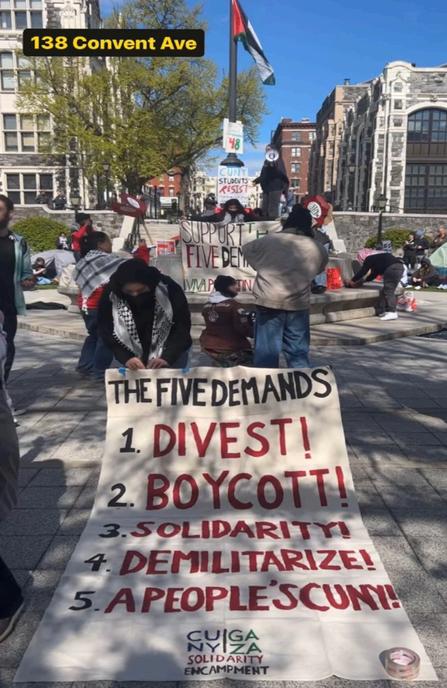
that In the United States, I encountered these other Jews. I grew up in the Amalgamated [a cooperative housing development in the Bronx, sponsored by the Amalgamated Clothing Workers Union]. And I remember my first time when I was in the park flying a kite with a friend And she saw a star in the sky and said, "I have to go home " It was Friday, and the first star indicated the beginning of shabes, about which I had no clue. We were not religious in any way. We were not kosher We didn't go to synagogue And we were not anti-Zionists at that point, and Israel just hardly played any part in our existence I just grew up with Israel in the periphery. So to me, politics was Bundists and Bundism. Bundism, of course, meant socialism. It meant Yiddish and Yiddish culture. And growing up in the Amalgamated was like living in a Bundist shtetl There were Yiddish newspapers, a Workmen Circle Yiddish shule [pronounced “shuleh,” (after-school) classes for secular Jewish children]. It was the biggest in the city. We had a hundred kids. Chaim Grade lived there, so you could bump into him on the street! You know, it was very, very different So I was very shocked, for example, when, during Passover, Pesach, when I went to my public school to see girls with matzo sandwiches. We ate matzo, too, but we didn't give up bread If you ' re going to have a sandwich, you used bread
“I DIDN'T REALLY LIKE ISRAEL. I FOUND ISRAELI ATTITUDES TOWARDS SURVIVORS AND THE HOLOCAUST TERRIBLE. I MEAN, THEY JUST THOUGHT WE DIDN'T RESIST. “
About Israel: One of the things that Bundists recognized was that there were Bundists in Israel, because a lot of survivors that had no choice, ended up in Israel So in 1962-63, between college and graduate school, I went to Israel So I saw Israel before the '67 War And in fact, I worked on one of the kibbutzim that was attacked on October 7, Nir Oz. It was a brand new kibbutz, just five years old. Everybody was maybe 23, 24. They all served in the IDF Nir Oz was really a military outpost at that time, which I didn't realize There were around 40 very young kibbutzniks there And it was right on the Gaza border.
This was a Hashomer Hatzair [left-wing Zionist] kibbutz Before she met my father, my mother was a
Zionist, and the son of a childhood friend was in Nir Oz. So that's how I got to Nir Oz. Then I went to another Hashomer Hatzair kibbutz. And Abba Kovner [a leading member of the Jewish armed resistance movement in the Vilna Ghetto] was on that kibbutz But he was away So I never got to meet him I also went to Lohamei HaGeta'ot and missed Antek Zuckerman and Zivia Lubetkin, who also were not there that day [both were leading figures in the armed Jewish resistance in the Warsaw Ghetto] I just missed everybody who knew my father and who fought with him
Though I liked and became attached to many people that I met there, I didn't really like Israel. I found Israeli attitudes towards survivors and the Holocaust terrible I mean, they just thought we didn't resist [IK's father, Michal Klepfisz (1913-1943), was a Bundist and an active member of the Jewish armed resistance fighting the German Nazis in the Warsaw Ghetto ] I didn't like their attitude towards other Jews I did not like how the Israelis said that Jews were sheep They wanted to disassociate themselves from the 6 million. The Israelis were “the new Jews” and all that nonsense. And this was maybe a year or two before the Eichmann trial The Eichmann trial turned things around in Israel a lot Abba Kovner and other survivors testified There was more information about resistance in ghettos and camps. Israelis began to understand more about what had happened. But from then on, I was just sour on it. But at the time, I was also totally nonpolitical I did march in the '60s in Chicago against the war and once for civil rights in Skokie, outside of Chicago That was it. I remained apolitical and uninterested in Israel. I was interested in the United States, but I wasn't engaged until I came out And when I came out when it becomes that immediately personal you become active I came out over the issue of homophobia, an issue that my parents and the Bund had never thought about. "Lesbians" and "gays" weren't even in their vocabulary. Their doikayt was quite different from my doikayt
After I became more known through my poetry and partly because of my background and the war, because I had this connection to Yiddish culture somehow America's craziness around “the authentic Jew” landed on me So within the movement, people
started looking to me for answers And when I entered the movement, I entered it in the left People describe the movement as very monolithic. It wasn't. There were many arguments, for example: Is racism a feminist issue? Do we have to address class? That kind of thing And anti-Zionist issues were being discussed And women started asking, "Oh, Irena, what's the answer?” And I didn't know. I was uneducated. But I was really, really pushed.
We formed a lesbian group called Di vilde khayes [The Wild Beasts] to try to address this issue But we really were unprepared We were so ignorant I think we formed it like in '81 or '82, and by '82 Israel had just invaded Lebanon, and there was the Sabra and Shatila massacre And so, at that point, I started becoming more serious And Melanie Kaye/Kantrowitz and I decided to edit a Jewish feminist secular anthology. Susanna Heschel had published “On Being a Jewish Feminist.” But it was focused on observance and rituals. And Melanie and I are both secular and felt it didn't speak to us We wanted a more comprehensive anthology, and we wanted gays in it. And we recognized multiculturalism within the Jewish community. And we also wanted Israeli Jewish women represented. So we decided to go to Israel to talk to Jewish and lesbian feminists And this is like 1985 So that was my first trip back And it was a different country than what I had seen in '63. Totally different. And we connected with a lot of lesbians and feminists and talked to very prominent
figures like Alice Shalvi and Galia Golan Galia Golan had started Peace Now She also initiated the first women’s studies department at Hebrew University. For me, this trip was a real education. I saw the West Bank for the first time, and I was shocked Because my whole sense of history was based on the use of the word "settler " And I had seen a kind of "settlement" in Nir Oz in 1963 which was totally impoverished. But when I got to the West Bank and saw these housing complexes, I said, “These are settlers? Settlements? These are like monuments for the next 300 years!” So it was a shock And of course, one of the things that came up was my socialist beliefs and how I was raised. And I was kind of remembering my Bundist socialist upbringing I didn't really have a grasp of Bundist history I knew it anecdotally, and I knew it only in its broadest principles So I started learning and reading and teaching and feeling very comfortable with it, but realizing it needed "updating" to my doikayt and to the U.S. to include issues like homophobia, racism, etc And at the same time, I started learning about the Bund's struggles with Zionists before the war and realizing that everything that the Bundists had predicted was happening.
I always thought of myself as a Bundist, even though there was no Bund, really There's a lot of nostalgia about the Bund, and more people are beginning to appreciate it.

JW: Turning to the present: Has the war in Gaza made a real inflection point in Jewish history?
IK: That's what they talked about today, actually [referring to a conversation with Rashid Khalidi and David Myers hosted by Peter Beinart earlier in the day this conversation took place]. What is this historical moment? Everybody recognizes it's a historical moment Nobody knows where it's going
JW: Right. But it's going somewhere else than where it's been going.
IK: Maybe I mean, we want it to go in a different way
M: If I can pose that question, actually. Where do you think we should be taking it? If we have control over that narrative, where should we lead with it?
IK: It's a complicated question Do you mean immediately in response to the war? Or, in the long term? One way to answer is to ask: What do you think is missing?
What is it that's missing that needs to be created and that the Bund could address? I could list a whole string of things that are missing. First of all long term: I raised this at the conference Jewish education is a mess And I'm not talking about Hasidim; that's a whole other story But in these other Jewish schools I was shocked that one of my friend's sons in such a school was told to write letters to “their soldiers in the IDF.” What are they teaching there? At Barnard, I encountered students who had Jewish educations but who didn't know the word “occupation ”
I think teach-ins are great especially for addressing immediate issues. One of the things I know that they have on these encampments is teach-ins And you should be able to do teach-ins outside of the encampments, in some way, so that people are getting historical information. What's missing is, I think, accessible, easily-read literature that outlines some history that you can give out at protests or at meetings I think that's critical It's one of the things
There's one function that's very obvious for shortterm issues: you want to pressure for immediate change But I think one of the things that you have to do is identify who you ' re talking to Who do you think you can reach? And what is it exactly that you want to say? And I don't think that's very easy to formulate.
“AT BARNARD, I ENCOUNTERED STUDENTS WHO HAD JEWISH EDUCATIONS BUT WHO DIDN'T KNOW THE WORD “OCCUPATION.”
One of the things that I found that's very useful is to have what used to be called in the women ' s movement, “CR groups,” consciousness-raising groups And you say, “What is Zionism?” Start with the simple one. “What does Zionism mean?” Or, “How are you Jewish? What's a Jewish activity? What is antisemitism?” And out of those kinds of conversations emerge really good ideas about people's strengths, what they believe, what they're missing, what they want, what they're afraid of. And also, it becomes a way of finding out who you should be addressing and also how you should address them We need an educated, up-to-date membership
David Myers today said, “Ask the question, ‘What does this word mean to you?’ or, ‘What does this idea mean to you?’” They were talking about "from the river to the sea " And it was interesting that David Myers said there was a recent study done, and that 66% of Jewish students questioned considered this slogan to mean annihilating Jews in Israel. 86% of Muslim students didn't see it that way. They just saw it as freeing Palestinians Two very different meanings of the same phrase That kind of education seems vital Because everybody is walking around totally ignorant of history. The Bund was always strong on education and on literacy. Very bookminded.
I think it's important to emphasize that Bundists weren't just socialists focused on economics and class systems or only on anti-Zionism. They really wanted to improve all aspects of life. And it's true that they had sports organizations because Jews were locked out [of Polish sports organizations] But it's also true
that, even now, people have a need to create their own communities. Somebody at the conference [referencing the symposium on “The Jewish Left” organized by Boston University's CURA on May 3, where IK was a speaker and JW attended] said, “People like to belong ” They want to belong to a kind of community that they can share, not just the immediate issue you ' re protesting for or working towards, but who can share a meal together, who can share theater together And the Bund was amazing about that
My father is always described as a Bundist. Well, you know, he was very active in Morgnshtern. Morgnshtern was the Bund's sports organization! (laughs) That's what he loved He was a real sportsman So the Bund had a variety of organizations, including SKIF [Sotsialistishe Kinder Fareyn Socialist Children's Association]. Tsukunft, the youth movement. They organized schools and libraries and the Medem Sanatorium, which was a very famous sanatorium that was created mainly for poor children who had tuberculosis and who came to be cured for long periods of time. But what was special about the Medem Sanatorium was that it was run by the kids The kids were being taught to practice their socialist principles But all these were political institutions We need institutions like that. And we don't have them.
“[PEOPLE] WANT TO BELONG TO A KIND OF COMMUNITY THAT THEY CAN SHARE, NOT JUST THE IMMEDIATE ISSUE YOU'RE PROTESTING FOR OR WORKING TOWARDS, BUT WHO CAN SHARE A MEAL TOGETHER, WHO CAN SHARE THEATER TOGETHER.”
We need institutions, educational institutions that teach the parents as well as the children We have lots of opportunities to learn about the classical Yiddish writers like Sholem Aleichem and Peretz. But there is so much more to be offered. Again teaching the parents as well as the children No one is doing that in a focused and systematic way But that's the kind of thing that the Bund could offer Provide a cultural institution that is rooted in Bundist politics and that's not afraid of being openly socialist and political But, of course, a lot of this requires time
M: Speaking more about nature and nurture, I think a lot of the issues we ' re facing now with educating youth and this is becoming less of an issue as materials on the internet become easier to use but a very large problem is that the nurture in America is so absolutely ingrained in liberalism and capitalism that there's almost the Mark Fisher: You can't imagine a world after it [referring to Mark Fisher's influential Capital Realism: Is There No Alternative? (2009)] What do you think is the best way to start working toward breaking down those preconceived notions? Stuff that people don't even understand is political, but is.
K: There's no magic answer for that One thing that, unfortunately, we all have to get resigned to is that nothing happens quickly Especially shifts in consciousness. As I said before, there's the immediate and the long-term. For the long term, things happen very slowly. But what I would suggest is that you start building a committed group of people It can be small I used to have students who used to say, “I want to do this and this, but there's only two of us that want to do it.” And I would say to them, “Do it!” Because I've been involved in projects that began with just a handful of people One of the most influential magazines during the feminist Second Wave for like 30 years was Conditions magazine Four of us started it. Nobody had heard of us before we began. It was never, in terms of numbers, huge. I don't think we printed more than 1,500 copies per issue and that was for something special And we came out very irregularly But it was incredibly influential, with major writers contributing
[With] the Bund, in 1897, 12 people met in an attic in Vilna, and 30 years later, hundreds of thousands identified as Bundists And Black Lives Matter, three African American women started it So if you get together a small number of really committed people and try to figure out how each of you can reach a certain number of other people to achieve certain goals, you can be very effective
Be clear about your objectives: What do you want to achieve there? Do you want visibility? Do you want to
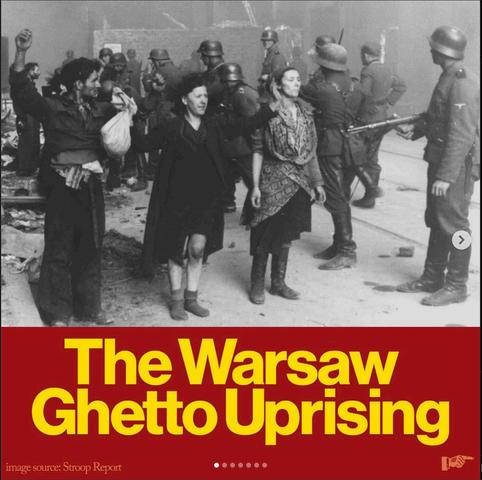
provide information? Have a dialogue? If you ' re going to protest, adapt your message. Maybe you shouldn t use the word “genocide” in certain places, because that immediately turns some people away Maybe you can just say instead, "it's terrible "
For a number of years, JWCEO [Jewish Women’s Committee to End the Occupation of the West Bank and Gaza] stood in front of Zabar's on the Upper West Side [the iconic Manhattan Jewish appetizing store] We met a lot of Jews; they all wanted to talk It wasn't a silent vigil but an invitation to discussion. Have material to give out and see what happens. Maybe you'll get people to join you Maybe you'll get a lot of hostility, which I'm sure you will Simultaneously, you may join the big demonstrations and do these other things separately while trying to build up your own membership.
M: For me, I lead the Instagram account with a couple of khaveyrim: @nycbund And on the anniversary of the Warsaw Ghetto Uprising, we posted a description of the Bund’s involvement in the struggle against the Nazi forces, and how much of it reflects what we see in Gaza now The complete destruction of an entire ghetto And how we can't let that repeat For things like that, I think that these mediums can be very helpful in just getting the image and the idea of it out there. And have people react
emotionally to it. But when it comes to getting people involved in the movement, we need writing. And we need people who learn
IK: Well, that's why organizing for either a discussion or a cultural event is useful. For example, the songs Josh wants to teach have an event in which you sing them here in New York and offer them to everybody Come hear a Josh concert, or whoever you want to work with And make it a Bund event And people will come You offer literature or history lectures, and maybe people sign up. I think it's the personal interactions, the contact with people, that engages people to join
You have to decide what your core principles are And they should be visible everywhere.
M: Right now we have the three pillars, which are Jewishness, doikayt, and socialism And those have led us well so far And we'll add to that We have a lot more to do
Original interview recorded on May 10, 2024.
Irena Klepfisz' most recent publication is "Her Birth and Later Years: New and Collected Poems, 19712021.
Joe Grim Feinberg
Lord General !
The land up there is fine but deadly
Its valleys may be moist and soft and sweet
Milk indeed flows from its hills.
But its plains are naked sand, and also prone to floods
They say, moreover, that in rage it struck a whole sea dead and left it there to dry beneath the ruthless sun
Its face is worn by wind, skin pricked with desert stubble, bruised by fast-slung stones, scarred by blows of twisted olive wood, swollen with boils of ancient rubble mounds, festering wounds stitched up with vines, hair gray with dried-out streams, chin speckled white with crumbs of fallen walls, lips dripping gold and red with honeyed blood, teeth as sharp as mountaintops and white as enemy bones
It devours all who settle there. Its stomach rumbles as its victims clash and churn within until it spews them out into the stinking marshes of its unwashed loins
Besides, Lord General
even if we wanted it, it’s full.
Giants roam the hills, mosquito armies prowl the swamps, murderers lurk in the deserts, peasants till the soil with ploughs that cut like daggers, and one of us, from a mountaintop, spied Philistines arriving, splashing the coasts with breathless waves and scratching the beaches with their keels.
You said it was promised to us?
And how many others? Lord!
General, we won’t go up! Your orders we respectfully refuse
It will be better to sulk back in our tents in no one’s land than walk into those Moloch jaws and slide into that gut of war!
Apologies, Lord General!
The land’s all right, the milk and honey, grapes and figs, they do tickle the tongue
But our stomachs fancy less the seasoning of swords. ◈
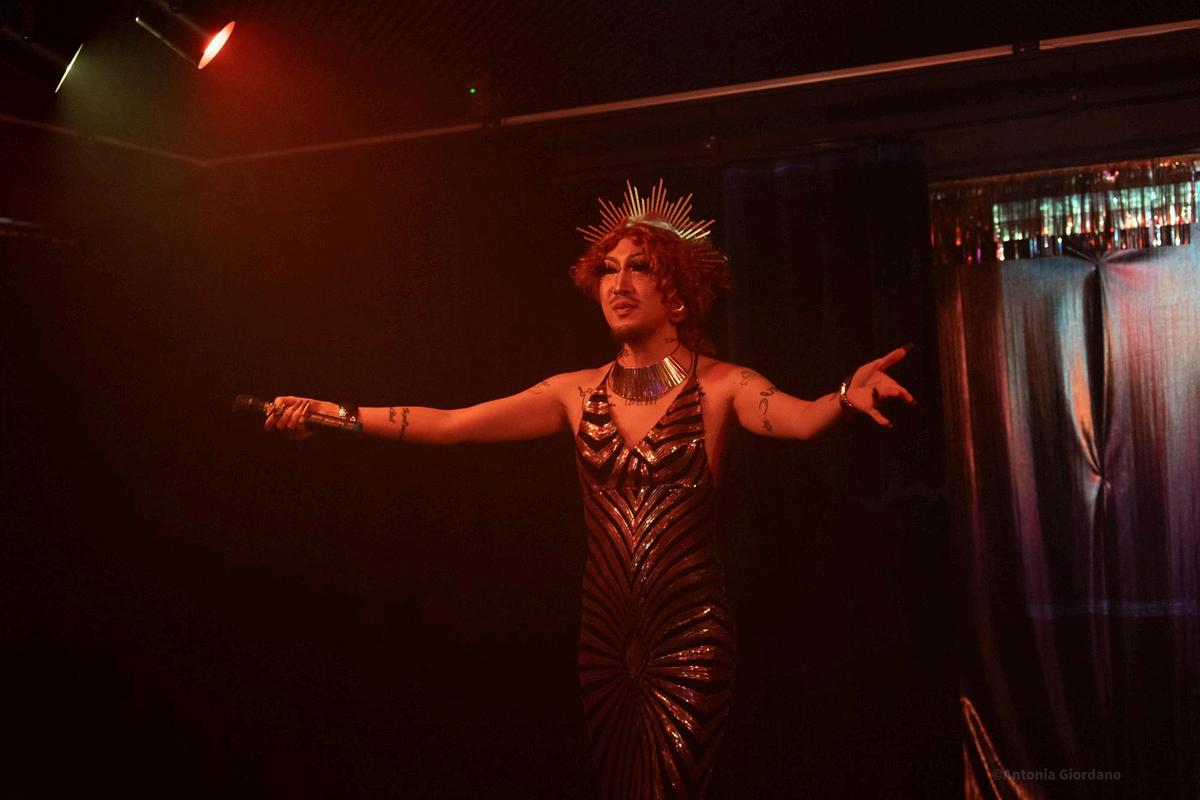
ANNA JO
Hakehillah was the first place where I felt accepted as a Jew with no other qualifiers, and it was also one of the only spaces I have in Korea where I feel more completely seen for who I really am, rather than who I am supposed to be Hakehillah Korea’s ‘queerness’ is a function of our hospitality. We welcome all Jews for who they are, as they are We invent and reinvent our traditions constantly. There is always a connection to our people and our ancestors, and at the same time, we feel a responsibility to engage in tikkun olam, and create a better world than they had This brings me to the importance of doikayt (“hereness”) in our community
In Korea, there are a wide variety of Jews who participate in our community. In fact, the progressive Jewish communities across Asia might be the most ideologically diverse just because Jews are extremely rare – we do not have any other choice but to stick together. For this reason, we’ve largely skirted the “Israel Issue” for years Even among Hakehillah Korea’s leadership, we have so many differing opinions of Zionism, from its definition to its necessity or need for abolition, that we prefer to ignore it Israeli politics don’t affect us much in Korea
But since October 7, everything has changed For some reason, all the other wars and flashes of extremist violence managed to evade us here on this side of the diaspora until then At first, it was quiet
The situation for Hakehillah Korea was chaotic From my perspective as an American-Korean, Jewish, very politically left woman who leads a Jewish community that obviously has Israeli participants, I was overwhelmed. I stayed quiet. I had a responsibility, but to do what? What would make a real impact beyond feeling self-righteous?
We continued to watch the news in horror. Many Jewish organizations worldwide had made their stance clear. Socalled progressive organizations that had helped us get established began posting things online that implied that any criticism of Israel was antisemitism They began to post what looked like propaganda for the state of Israel It felt like we were also expected to fall in line, to provide unquestioning support for the state of Israel as a function of our grief over the attacks
Only two short months after October 7, we hosted our Chanukah party Chanukah is the unofficial birthday of Hakehillah Korea Our party was great, as always We made at least a thousand latkes, Korean-style fried veggies and tofu, drank wine, and sipped on Russian tea late into the night Our candle lighting was so beautiful and such a fire hazard How wonderful it was to see overwhelming beauty when the world is falling apart
Many of us were feeling alienated from our own Jewishness due to the rhetoric of the greater Jewish community, myself included
But the mood was already ruined. Multiple Jewish sources were publishing articles about how winning wars and Jewish supremacism (reworded as “Jewish Pride”) are the true meaning of the holiday. Comparing Israel to “light” and Palestine to “darkness.” We had to ban a member from coming to the party because of their anti-Arab comments. It was tense. Many of us were feeling alienated from our own Jewishness due to the rhetoric of the greater Jewish community, myself included.
So I decided to make a speech – something that was more than a simple explanation of the holiday I rebuked the black-and-white narrative, and I spoke truth into the darkness of blind ethno-nationalism I cried But when it was over, I was embraced by our community I broke the silence, saying what had remained unsaid for too long It didn’t matter what varying political views or national backgrounds we had We all agreed that the Jewish people needed to survive the nationalism, war, hate, and violence
Even when we were among the perpetrators
As Purim approached, we decided to fundraise for World Central Kitchen rather than a local charity As we planned our Purim spiel, there was a lot of pressure on both sides of our collaboration with a local drag troupe to perform the correct amount of activism for or against the state of Israel
On the Hakehillah Korea side, a couple of Israelis left the Jewish group chat out of anger that we would dare raise money for innocent civilians to eat food in Gaza. Our partner organization’s side faced criticism for supporting an organization that also prepared meals for Israelis who had lost their entire communities on October 7. This is the world we are in, a world that reduces nuance and humanity to war factions that can easily be reproduced in Instagram infographics.
While we are always doing the work of balancing, I consider our decisions to be not “in the middle” of this ideological conflict We clearly have taken a side – the side of humanity, the side of love, and the side of peace
Sometimes this means calling out the crimes of Israel, shining light on the suffering of everyday people, and drawing connections between our history of genocide and current events It means fighting for the spiritual survival of Judaism
By including us in their rhetoric, Israel has inadvertently invited all Jews into the discussion, and as it has done so, many have concluded that we don’t need Israel after all
Our community, and many others across the globe, are uniquely positioned in such a severely unsupported corner of the diaspora that we can basically do whatever we want I cannot argue that Hakehillah Korea is Zionist or antiZionist because we do not concern ourselves with these labels We are primarily concerned with our own people
At the same time, we cannot ignore the evil being done using our religious symbols and vocabulary. By including us in their rhetoric, Israel has inadvertently invited all Jews into the discussion, and as it has done so, many have concluded that we don’t need Israel after all. And for those, like me, who have a strange, internal pull towards the land of Israel, it is imperative to use this desire for our own sense of place to strengthen our own communities so that we can feel secure without participating in the oppression of others.
Hakehillah Korea has always been intentional in our decisions, words, and structure We continue to find our people, our purpose, and deepen our commitment to doikayt in a very unexpected country, at an important turning point in Jewish history
You can find more information on Hakehillah Korea here
by Der Spekter editorial staff

protest
and activist
talks contemporary Bundist politics and the growing problem of philosemitism in Europe.
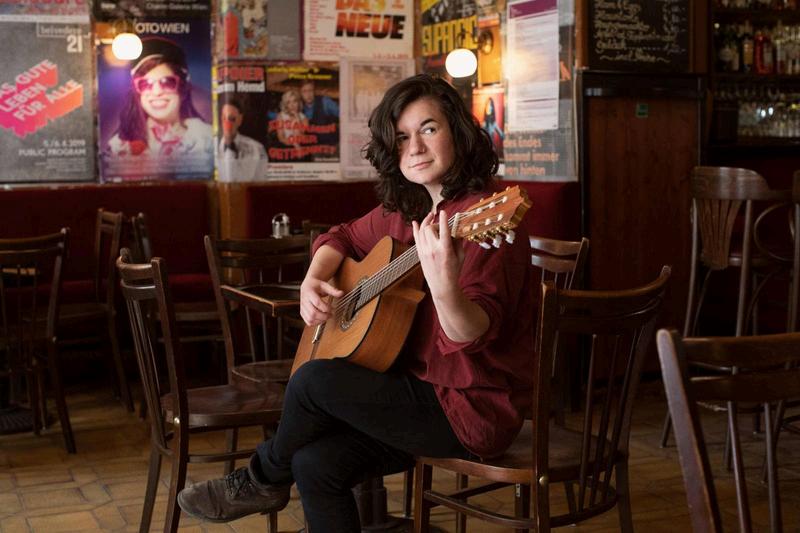
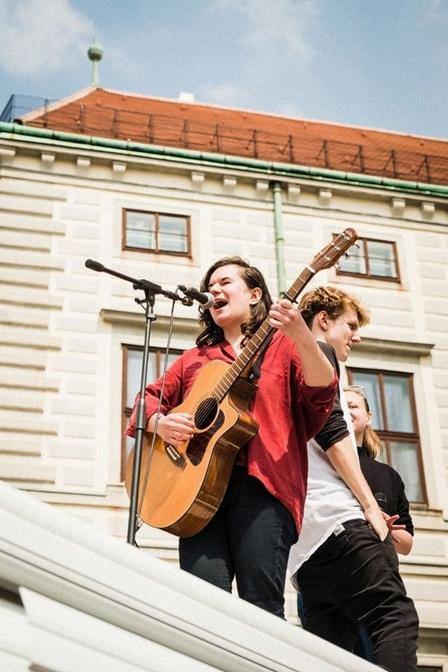
In the spring of 2019, as thousands protested outside of the Vienna Chancellor’s office against a far-right politician embroiled in a corruption scandal, 24-yearold Isabel Frey performed the classic Yiddish ballad “Daloy Politsey” “Down with the Police ” Originally written in the early 20th century to call for the overthrow of Tsar Nicholas, Frey adapted her own version of the song in Yiddish and German with the line “Down with HC (Strache)!” referencing Vice Chancellor Heinz-Christian Strache, who resigned a few weeks later The song “became like a hymn for the next time; they printed out text and gave it to everyone, and I sang it again the next week,” Frey remembers.
Der Spekter caught up with Frey about her activism and music projects Our conversation took an unexpected yet fascinating turn into the growing problems with combating antisemitism within the context of the rise in prominence of philosemitism, a particularly acute problem in Europe, where atonement for the Holocaust too often masquerades as support for the state of Israel
This interview has been edited for length and can be read in full on our website
Isabel Frey [IF]: I grew up in Vienna in a very secular environment, but still very much with this strong minority identity. It was important to go to synagogue and to retain that identity, less so for religious reasons My grandparents are Holocaust survivors, and I grew up in this city, which has a very strong Jewish history; my family is also very rooted in that Jewish history, in the Austro-Hungarian empire. I grew up in a time when there was a very small Jewish community
Growing up, I went to a socialist Zionist youth movement, Hashomer Hazair. It was less of a choice motivated out of Zionism per se, which is the case for a lot of European Jewish communities For my family, it was just an opportunity to give me some kind of Jewish environment because I went to a public Austrian school and not a Jewish school.
When I was 18, I didn't realize I was a Bundist yet, but I started to feel a disjuncture with the Zionist narratives I had grown up with I had already started engaging with socialist ideas through the youth movement and joining anti-fascist protests. And then I went to Israel for a gap year with the youth movement And there my first realization that I was a Bundist started, because I felt homesick in the place
that was supposedly my home, realizing that Israeli culture is a lot farther from what I had grown up with, and it was not familiar to me. I also realized that I missed this urban, Jewish life that I felt very strongly The other realization was going to the West Bank for the first time on a Breaking the Silence tour and learning about the occupation and the gravity of the occupation, understanding that I had grown up with only half of the narrative, or a falsified historical narrative
I didn't really know about the Bund until two years after, when I was living in Amsterdam and studying there. I was in a very politicized student scene the squatters movement, student protests; it was also very decolonial Through coincidences, I found Jewdas, the London Jewish anarchist collective, online I went down the rabbit hole of the Jewdas website and then stumbled upon Daniel Kahn's music. A few songs like Daniel Kahn’s “Arbetlose Marsch” and “Daloy Politsey ” Through that, I started to learn more about the Bund And then there was the feeling of “wow, I'm not crazy; these things already existed in an ideology, and they continue to exist in a lived world of young left-wing Jewish people.”
“[IN ISRAEL] MY FIRST REALIZATION THAT I WAS A BUNDIST STARTED, BECAUSE I FELT HOMESICK IN THE PLACE THAT WAS SUPPOSEDLY MY HOME.”
Before I even got into the Yiddish music world, I joined a “Birthwrong” trip in Marseille It's the idea of having a birthright to the diaspora and exploring diasporist politics. I was also, at the time, already into singing songs but didn't really know any Yiddish and didn't really know about the Yiddish music world But [the trip] was already very Bundist, and we were singing a lot of Bundist songs So from there, I learned for the first time about the Yiddish music world. And I got inspired to also take lessons in singing and going to KlezKanada and Yiddish Summer Weimar And this also furthered my engagement in this combining of music and Bundist politics But also, I started singing Yiddish songs when I was still in Amsterdam, which I learned mostly through YouTube, but I started performing them at protests The first time ever was when there
was a small tent student occupation against neoliberal politics at the university. I just went there with my guitar and started singing. And then the police evicted us, and I sang Daloy Politsey. My first concert that I did was in a squat, also in Amsterdam
Another time I performed at a climate justice protest
So I really started more as a protest singer because I was very actively involved in a lot of these movements.
JW: Have there been issues of antisemitic incidents? Is that a factor? I remember there were times in Poland when the Bund would take positions, for example, against anti-Kashres laws (laws banning the preparation of kosher meat), even though they were staunchly secular and none of them were using shokhtim (ritual slaughterers), but because they felt it was an antisemitic act.
IF: It gets a bit messy nowadays because there's so much weaponization of antisemitism and so much Palestine solidarity is being criminalized as antisemitic. At the moment, for example, at any kind of Palestine protest that goes through the second district is already an “antisemitic” incident in the media There was also a time a couple of years ago when the Austrian government was really starting to question ritual slaughter. And these are both cases which affect both Jewish and Muslim populations. I think the ritual slaughter conflict was also in Germany, and it was very bad because there was a lot of antisemitism and anti-Muslim racism happening in these debates.
Obviously, there is antisemitism in Austria and Vienna, and unfortunately, it’s growing It's just so difficult at the moment as a left-wing Jew because part of this struggle right now is not just to fight antisemitism but also to fight the anti-antisemites who are doing this in a reactionary way So it gets very muddy and complicated in that sense
Antisemitism is also often strategically exaggerated, especially when we ' re talking about antisemitism in
Europe, and especially Austria and Vienna It's important to be honest about it and focus on the populations who are actually facing much more extreme forms of racism at the moment, which in particular is refugees and undocumented people and racial minorities that are racialized, in hegemonic public discourse
I would say a lot of it is also philosemitism at the moment, especially in Austria and in Germany Calling out philosemitism is a big part of what I do Philosemitism is a part of antisemitism; it is kind of the other side of the coin. It's still an othering. It's a fetishization and instrumentalization. It doesn't mean that it's necessarily good.
ML: I'm glad you mentioned philosemitism That's actually a lot of what we see in places like Taiwan and China as well. There's this very stereotypical understanding of Jews as rich, smart, good at business In China, specifically, since it's so closed off and it's such a surface-level understanding of what a Jew is, it actually completely flipped on its head after Oct. 7 and became much more blatantly antisemitic, particularly fusing all Jews as Israelis or supportive of Israel Is that playing out similarly at all in Austria as well?
IF: I will say the philosemitism is less so about positive stereotypes about Jews. It's a lot about this idea of “all Jews support Israel,” and this very strong support of [Israel] A week after October 7, when the bombing attacks of the IDF had already been in full swing in Gaza, the Austrian government raised the Israeli flag in front of the chancellor's office. And they already did that two years ago in the last Gaza war, when there wasn't even an Oct 7; basically, the whole thing was started by the IDF in Jerusalem
So this is the kind of philosemitism, and it's a philosemitism that is directly also spurring antisemitism in marginalized populations in Vienna, especially Palestinians or people with ties to other Arab countries see that and are like, “What the fuck? Who are these Jews that manage the government?” Really, it has to do with the way the centrist and the elite in Austria has found a way to portray itself as post-Nazi, but then at the same time liberal, but then
use that to exclude other minorities and espouse antiMuslim racism. So it's part of this instrumentalization that there's this very strong support for Israel.
“PHILOSEMITISM IS A PART OF ANTISEMITISM; IT IS KIND OF THE OTHER SIDE OF THE COIN. IT'S STILL AN OTHERING. IT'S A FETISHIZATION AND INSTRUMENTALIZATION.”
Another part of the philosemitism, I would say, I feel it a lot as a musician On one hand, I'm kind of profiting from it The reason why I have concerts and why I can organize music festivals is because there is a certain kind of societal, if not philosemitism, then this type of interest in Jewish culture that is also spurred out of guilt, or the fact that this lack of acknowledgement of responsibility hasn't happened for so long But I feel it a lot also when I'm performing, that there's a kind of othering gaze, even though it's not necessarily a negative gaze. And it makes sense, because there's a very, very small Jewish community of about 8,000 in Vienna In the Austrian public school system, you learn a lot about the Holocaust. The Holocaust is mostly focused on the genocide of Jews and less so on other populations, like the Roma I still think it's way better than antisemitism, but it just doesn't mean that the othering is gone I think that's important
ML: You mentioned before that when you started doing a lot of performing at protests and then later running a seat on the District Council, you were hoping that it would give rise to a new leftist Jewish politics in Vienna I'm wondering if you ' re seeing that play out more now, post-Oct 7 I also know that you recently founded an organization called Standing Together in Vienna, inspired by the movement of the same name in Israel-Palestine Are you seeing this type of organizing grow now more than ever?
I’d also like to ask about some of the discussion around Standing Together. Some people think that the organization is normalizing Israel; there has been some controversy around the language they use
IF: Standing Together is just a movement in IsraelPalestine, not an international group. But [our group] is inspired by Standing Together, and it started with the German term, but somehow we ended up having the English term because many people in the group don’t speak German And for us, it's nice to have this association, but we are not part of the same organization. We see the main goal and impact is to stop this playing out of different minority groups against each other and to actively build against that in Vienna And I think that's what's really important at this moment
Since Oct. 7, I see globally that there has been a lot of change in the global Jewish left happening. I would say in Vienna, not so much A bit There are more pro-Palestine Jewish groups, or Jewish people in Palestine activism, but it's also gone in the other direction. The mainstream has also radicalized toward the right. So, it's a bit difficult. The inspiring pictures of the Jewish Voice for Peace actions in the U S [are] not really what's happening in Vienna What I've been doing with Standing Together is a bit of a different thing. And maybe things shifted for me on some level on Oct. 7, with the realization that a certain level of societal polarization, and also standing between different communities that I'm engaged with a lot, has gotten so extreme It really came out of this week after Oct. 7 and the sense that there were demonstrations happening where only the Palestinian victims were acknowledged, or only Israeli victims were acknowledged
Maybe this brought me away from some more radical critiques of universal humanism than trying to organize something that was acknowledging the humanity of people while at the same time addressing the structural violence that has led to it I co-founded it with people from the Israeli-Palestinian artist collective One State Embassy, many of whom have been involved with the Israeli peace movement. Also, Palestinians who have also been marginalized in their communities for engaging in a joint group with Israelis
I have to say, with normalization critique I can understand where the critique comes from. There are many situations where pretending that there are equal sides really leads to a reproduction of violence On the other hand, what a lot of people who have been there, or lived there, or are from there, feel is that it cannot work without some kind of eye to eye. If it does reproduce violence, maybe the goal is to try to find formats or find ways of joint action that are not reproducing violence
Original interview recorded July 2024
You can find Isabel’s music and more information about her work on her website and Instagram

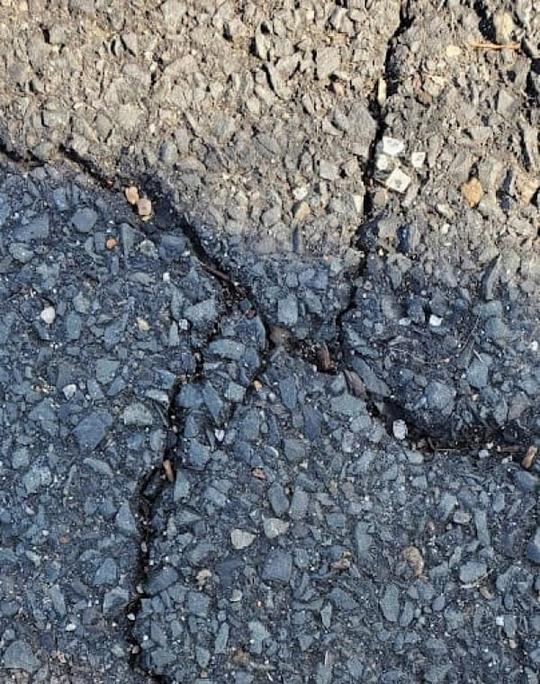
MIR ZAYNEN DO we are here is a declaration of survival a demand to exist out loud in color but also and also to be here not somewhere else
MIR ZAYNEN DO we are here means not having to leave not being confined in a ghetto of your creation or of ours not being confined to one land not needing a haven being free wherever we are
MIR ZAYNEN DO we are here means seeing the aleph formed by cracks in the asphalt means going back to the beginning right here where we already are and seeing ourselves in the foundation of the here means standing on that foundation marching on it running free not away
‘SVET A POYK TON UNDZER TROT
MIR ZAYNEN DO our footsteps will be a drum beat of we are here means here on that foundation we stand up for everyone with everyone means we are the aleph in the asphalt the starting letter the primal vowel the ah the oh the silent spaceholder for other sounds
MIR ZAYNEN DO we are here means right here yes even here in the cracks we begin and begin and begin again begin is an anagram of being yes, Reb Leonard, the cracks are how the light gets in but also and also where it shines out
MIR ZAYNEN DO cracked aleph in the asphalt means we are here to let the light in to let the light out with our wise cracks and louder noises
‘SVET A POYK TON UNDZER TROT
MIR ZAYNEN DO means we are here for good
Joe Grim Feinberg
Our god skipped out on us as we were leaving Egypt
He said he had another place to be, some other people in distress, some army to trip up as it crossed some marshy sea. We waited long, but when He didn’t show we left.
We went around by dryland paths, through all the wilderness alone.
We passed Him on a desert peak
Looked up, and there, His smoke and light, beside some bearded fellow holding up some stone a lease of sorts, we heard them say, already signed we pitched our tents the beard guy rushed away. He came back hobbling, head down, lease broken in two
The god turned to us, fixed the stone, and said, “Rights to a future land, for usufruct in perpetuity
I’ll offer it instead to you ” His signature, already carved into the stone as one big X
(he wouldn’t use his name)
But when we questioned His conditions, strained our eyes at the fine print, called our lawyer back in Uptown Rameses, asked around, He kicked us off the mountaintop
The other fellow signed again and left us there to camp out on the unclaimed ground
Under ungodly stars we thought back to the times when gods like this spoke softly to the outcasts and cast tempests at the mansions’ gates
Now only locusts chittered us to sleep
Years later we caught up with them, the bearded fellow’s folks, splashing across a river, the same god at their head. They blew their horns with glee, declaring they were home, but now they cried: the land was occupied.
The deed to it was forged
The whole damn deal a scam!
And when they turned to Him with their complaints, He was gone again
Left them to fight it out themselves with the others in the land
Who knows, maybe
He gave the same false deeds to everyone
Come on, God, we said, be at least a mensch, if not a man
Later still we heard Him, back to his old form, hissing at thieving kings, turning guards’ spears to snakes, turning the dust to lice to crawl into the smart clothes of the officers and goons
But when the gathering crowd realized who He was and called out, demanding what He’d promised long ago, He ghosted them again
Someone had built a temple and knowing His pride they lured Him in. He settled down inside
Only a priest came out, his vestments outshining a graying face that cloaked itself in musty dark, ash dripping from his smoky beard, his tongue full of commands “All deals henceforth,” he said “will be with me ”
Now and then rumors would spread about some coming end, when He would break out from His jail, clear the smoke, snatch flashes from the sky, but we got tired of waiting
Out here, below the temple steps, we learned to whisper doomed revolts amongst ourselves
We clamored hoarse, suspended prophecies and built ourselves, an altar to refusal
But keep the fire burning, cousins, will you?
For now, we’ve got our own affairs to handle just keep our number close in case our god returns
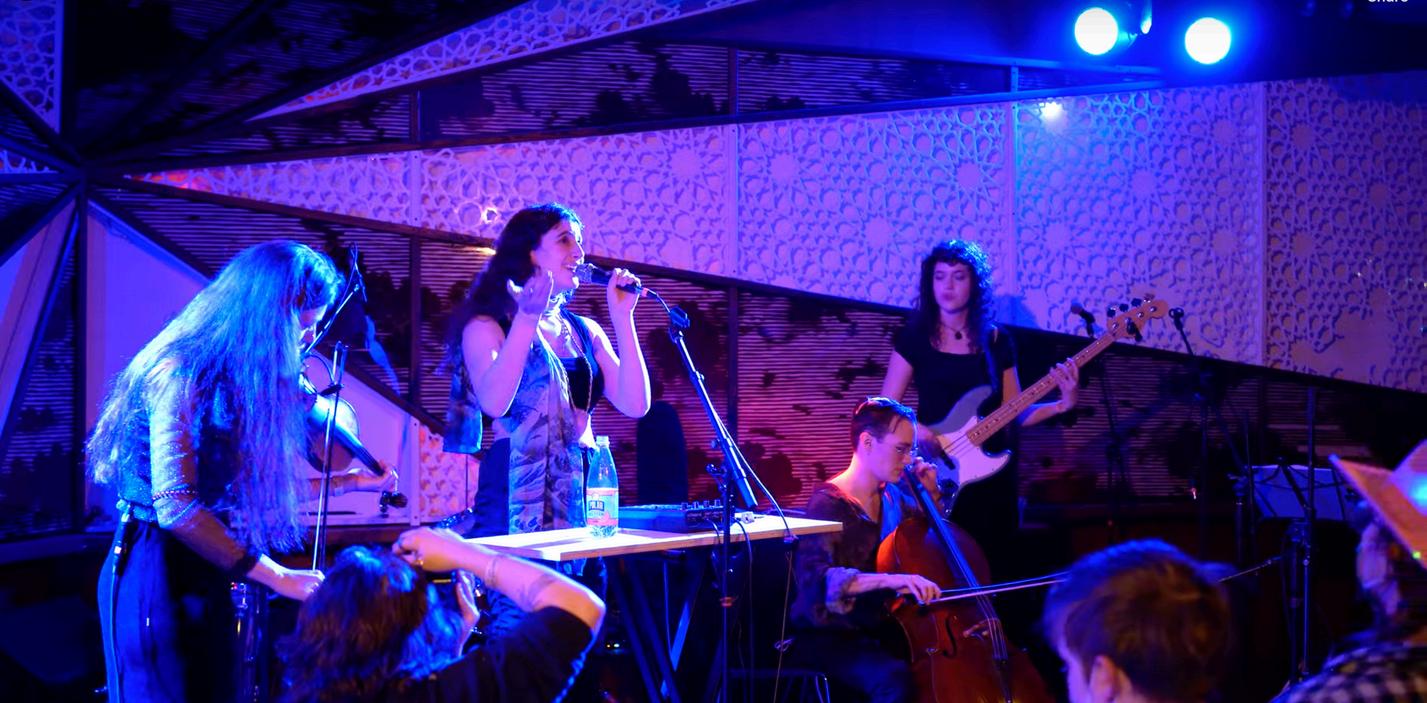
BY ABRAHAM PLAUT
Abe and Chaia spoke about the growing Kleztronica scene, what a commitment to Yiddish music means today, and the layers of meaning behind Chaia’s new single “Borough Park,” which was released on September 13, 2024
Abe Plaut: So to begin, for a bit of background, can you talk about your Jewish journey and what brought you to this musical moment with Kleztronica?
Chaia: My dad is a Jewish Studies teacher. So I grew up with different people in the Jewish community (like educators, cantors, rabbis, and musicians) coming in and out of our house. I grew up going to Jewish day school. My dad teaches Kabbalah, and I grew up studying with him. I started singing in Yiddish and got involved with the Klezmer scene as a teenager and went to the New England Conservatory I’m still very involved in Jewish religious life
For me, the most important thing about Kleztronica is that it comes out of the tradition of Black American house and techno music The history and tradition of Black American house and techno are rooted in Chicago and Detroit artists who made and [continue to] make liberatory music specifically for Black liberation
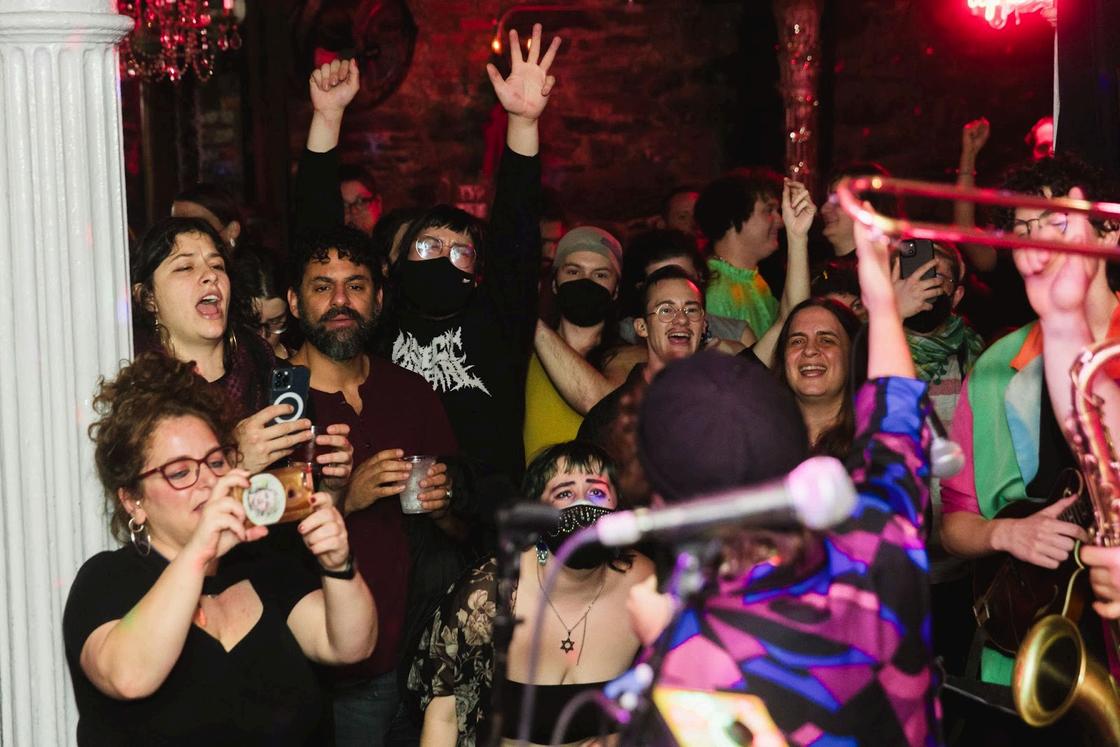
Similarly with Kleztronica, we’re using this liberatory music as a vehicle for Yiddish liberation and celebrating, supporting, and uplifting Yiddish culture
AP: What does the Yiddish music world mean in 2024, especially in the wake of the bloodshed and crises in Israel-Palestine?
Chaia: Yiddish was just day-to-day life, day-to-day speech, language, and ‘being’ in Eastern Europe In the late 19th century, you have the Modern Zionist movement coming up, and the Yiddishe Bund is saying, “No, if we go with Modern Zionism, we’re going to lose the things that make us Yiddish, the things that make us important ”
The broader Yiddish world was concerned about Zionism, but it was still a fringe thing to think of Yiddish as a radical movement The Bund was radical, but Yiddish was mostly just day-to-day life. But there was a lot of radical culture within Yiddish, just as there is within every culture
What started happening after 1948 is that Yiddish started to be taken out from the Jewish schools in the United States People said, “We don’t want anything to do with Yiddish anymore,” and Yiddish became positioned as a language of the past, rejected in favor of Zionism and Hebrew. It became this binary between Yiddish and Zionism Either you could study Hebrew in the schools and you could study about Israeli culture and language, or you could study Yiddish, Yiddish songs, Yiddish culture, Yiddish language And there was a lot of pressure to choose Hebrew

My dad grew up going to Jewish schools in Brooklyn and Queens in the 1960s without any Yiddish But my dad still is surrounded by remnants people who remember the old days of Yiddish and people who want Yiddish to [come] back This was a fringe group of people who were bullied at his high school and called the “Yiddish crazies” in his high school.
My mentor Hankus Netsky, who is a couple years older than my dad, grew up with Yiddish in his Jewish day schools and remembers being in the classroom when Yiddish was excised. Hankus is the transition point
So Yiddish was partly accidentally anti-Zionist. It was more that Zionism positioned itself as antiYiddish Yiddish was being stamped out in Israel, with people being beaten up for speaking Yiddish Since then, people have really begun cleaving to the idea of Yiddish anti-Zionism that was present in the
Bund, and it has become, among Yiddishists, primarily this radical thing Yiddish is anti-Zionism because Zionism is anti-Yiddish
More recently (since the Lebanon War), more and more Jews have become disillusioned with Zionism because we’re seeing Zionism become more aligned with interests that are not Jewish interests So there are more people seeking out Yiddish while becoming disillusioned with Zionism
This is where we find ourselves in 2024. Obviously, a lot more people have gotten involved in anti-Zionist culture since October 7th A lot more people have been looking for an alternative to Zionism or Israel as a vehicle for Jewish expression. The Yiddish music world and Yiddish cultural world have seen a big boom as more people become disillusioned with the idea of Israel being the safest place for the Jews The illusion of safety in Israel is being shattered for lots of people, so people are looking for other ways to practice Jewish safety. Yiddish has often been a great vehicle for Jewish safety, Jewish community care, and Jewish collectivism in diaspora
Kleztronica is one of those [Yiddish vehicles] We came from this same idea of searching for safety in the diaspora.
“YIDDISH HAS ALWAYS BEEN HOME IN THE DIASPORA; THIS IS SOMETHING THAT IS AS OLD AS YIDDISH IS.”
AP: In what ways is Kleztronica also tied up with Queer Liberation? And intersectional solidarity more broadly?
Chaia: So much of Kleztronica is copy-and-paste from techno and house culture, and Black liberation in techno and house culture All the queer parts are also copy and paste A lot of the techno and house DJs in Chicago and Detroit, and especially as the culture spread to New York City, were queer Black DJs. Queer, trans, every aspect of LGBTQ+ identity is represented in house and techno rave scenes. In a way, that’s because techno and house raves created relatively safe and liberatory spaces in cities where Black culture wasn’t given a fair place in the cultural landscape.
At the same time, in the 1980s, LGBTQ+ people were shut out, marginalized, and sent to underground spaces In the underground, at the raves, queer culture could thrive and flourish Kleztronica comes out of that tradition of house and techno raves.
On the other hand, queerness has been a big part of Yiddish culture for hundreds of years since the early beginnings of Yiddish theater and the days of traveling Klezmer musicians Wandering, itinerant traveling artsy people, especially in a flamboyant medium like Yiddish theater, could express themselves beyond the boundaries of traditional Jewish society in Eastern Europe We have drag Yiddish theater performers like Pepi Litman that we really look to as queer ancestors.
In the 1960s, Yiddish had become a somewhat fringe movement because it had been excised from so many mainstream Jewish spaces and replaced with Zionism The hippie movement was coming up; Hankus was also there, and we’re seeing the hippies, folk music, and people like Henry “Hank” Sapoznik doing American folk music in different places in Appalachia Someone asked Hank Sapoznik, “What about your own culture?” So Hank, along with many other hippies, started looking for his culture something that felt real and historically grounded but also countercultural A lot of these hippies, Jewish hippies like Hankus and Hank, found Yiddish
On the other hand, queer artists like Adrienne Cooper [and] Alicia Svigals are thinking about how Yiddish is on the sidelines of Jewish culture, and LGBTQ+ identity is on the sidelines of Jewish culture, and how Yiddish has this queer history So they’re working with Hank and Hankus on this project of the Klezmer Revival because they see that Yiddish has the potential to be a really big liberatory force for Queer Jews Irena Klepfisz,a [lesbian] Bundist poet and lifelong activist] has an amazing interview with the Yiddish Book Center on this that I often sample in my music.
AP: You’ve said that “creating home in the diaspora is a really important thing” and that Kleztronica is a “version of what that looks like ” Can you talk more about what that means to build a home in diaspora?
How does doikayt or hereness manifest in the Kleztronica scene that you’re helping to build?
Chaia: I don’t feel like I’m helping to build a scene; I feel like I’m practicing within a scene that already exists.
Yiddish has always been home in the diaspora; this is something that is as old as Yiddish is For me, growing up around Yiddish musicians, around Klezmer music, it feels like this is a tradition that I’m just joining. It is a tradition that we can enrich by creating new things within it, like people have always done But it is a tradition that is deep, that is rooted, that exists, and that we’re joining the ranks of [feeling at] home in the diaspora.
The Bund has this idea that Jewish safety comes with solidarity Doikayt is about supporting the people around us Hereness as in joining the labor movements Hereness as in collaborating with nonJews to ensure Jewish safety in the diaspora and to ensure collective safety through worker’s rights, through different minority group rights, through class solidarity To me, I think doikayt is really about working with what you have and working with the communities that already exist around you. The Yiddish community is so beautiful, and the communities in New York are so wonderful, and the communities in techno and house and all these existing communities are so amazing So for me, the most powerful thing I can do to ensure my community’s safety and my community’s care is to build collectively with the people around me who are already doing such powerful work
AP: What does it mean to address the “trauma of Zionism” in your musical compositions and live shows?
Chaia: I always come back to this Hankus interview with the Yiddish Book Center There’s some genius at the Yiddish Book Center who cuts these interviews and oral histories into short clips, each on a different topic, so you can search for a certain topic at the Yiddish Book Center and find lots of great interview clips
I studied with Hankus at the New England Conservatory, and in this interview he talked a lot about the grief of the decimation of Yiddish And the grief that after the Holocaust, so many Jews wanted to turn [their] backs on Yiddish in favor of Zionism. For Yiddishists, that’s the big loss for our culture. The abandonment and loss of Yiddish language, music, and culture Burying our songs, which were once really well known, into archives
There’s lots of traumas of Zionism; I’m not even going to go into detail about the death, destruction, imperialism, and witnessing bloodshed, especially now in the social media age Seeing bloodshed that’s not specific to my experience, so it’s not something I want to talk too much about because it’s a worldwide experience and anyone can see that for themselves.
Something that’s really specific to me is how my people’s language and culture and world was basically abandoned. People turned their backs in favor of Zionism-as-safety. With Kleztronica, it’s really important for me that we’re digging up this culture We’re digging up these songs out of archives My personal work in Kleztronica is all about two amazing, amazing archives: Itzik Gottesman’s Yiddish Song of the Week archive and the Ruth Rubin archive at YIVO These archives are curated and made by people I love, and putting these archival tracks on in the nightclubs and making hundreds of people listen to them and accept them and believe in them and feel what they’re saying is my love letter to all these wonderful people who help organize the archives The trauma most close to my own personal experience is the trauma of lost Yiddish culture and music and song; people being ashamed of Yiddish In Kleztronica, it becomes popular music, a liberatory vehicle, and a way to bring its radical history to light.
I will say that certain strategies of safety lead to lots of death, and other strategies lead to life and culture flourishing. We have a lot of Jewish history; we have a lot of death in Jewish history. We carry that with us. Even before Zionism, we have been persecuted for so many years; we have fought wars At the end of the Purim story [in Chapter 9 of Megillat Esther], we kill 75,000 people There is a lot of blood on our hands and blood we have lost. As much as we can
find ways to cope and mourn the violence in our history, we can find hope and new life and new safety "I think that really represents the vision of the Jewish world I want to see A Jewish world that doesn’t use force to solve problems, that doesn’t discriminate against denomination or background, or any of these things that divide us or create hierarchies "
AP: With your upcoming new music, your new album, and the lead single “Borough Park,” can you talk about what’s in that song? What are the samples you’re pulling from?
Chaia: The first sample is my grandmother speaking, an excerpt of a story she told me about her life growing up in Borough Park, the neighborhood in Brooklyn, New York City. I have this recording I took of her telling me this story and many more that will find their way into other songs on the album Each song on the album is wrapped up in one of her stories. Her stories are amazing because they are snapshots of Jewish life in the 1930s. Pre-Holocaust, pre-1948, they’re snapshots of the different kinds of liberations that were possible with a decade less of generational trauma This is a kind of liberation that I still think we can make possible today.
The second sample I’m using is from The Pennywhistlers Ethel Raim, an amazing Yiddish singer who co-founded the Center for Traditional Music and Dance, founded a choir called The Pennywhistlers. They did lots of Eastern European folk music with a focus on Yiddish music. The sample is from a song called “Oyfn Oivn,” which is about two people sitting on an oven A girl is sitting on an oven with a thread; she’s sewing a silk scarf A boy comes running by and yanks on the thread, and she says she’ll make him fall in love, but not by force, not with her hands; she doesn’t care about his background, but just with care and with love
I think that really represents the vision of the Jewish world I want to see. A Jewish world that doesn’t use force to solve problems, that doesn’t discriminate against denomination or background, or any of these things that divide us or create hierarchies This is a vision that my grandmother really experienced in Borough Park in the 1930s that she told me stories
about. A vision [of a world] with fewer boundaries, less stratification This song [“Oyfn Oyvn”] feels perfectly representative of that vision There’s also this cheeky element to it because it’s a metaphor for sex. At the end of “Oifn Oivn,” it says, “two people are sitting on an oven, and neither person is knitting or sewing,” and it’s this moment when the listener puts two and two together and realizes they’re having sex
"I THINK THAT REALLY REPRESENTS THE VISION OF THE JEWISH WORLD I WANT TO SEE. A JEWISH WORLD THAT DOESN’T USE FORCE TO SOLVE PROBLEMS, THAT DOESN’T DISCRIMINATE AGAINST DENOMINATION OR BACKGROUND, OR ANY OF THESE THINGS THAT DIVIDE US OR CREATE HIERARCHIES.”
Some Hasidic groups have taken this song and changed the lyrics to become religious lyrics, and I think it’s kind of funny that we now get to sing it again in this more cheeky meaning. Several exHasidic people have come up to me after my performances and said to me, “I heard that song totally different growing up,” so I think it’s great to re-introduce people back to this type of Jewish life where things were more freely moving between religious and cheeky profane spaces. There’s sex and mixed dancing, but it’s in Borough Park, and people are still living a traditional, orthodox Judaism It’s a vision of very pluralistic Jewish life That’s really what the song is about: pluralistic Jewish life that comes from care and love. It’s Ethel and her choir singing this song; those are the voices you hear singing in that sample
I studied Yiddish singing with Ethel; she’s a very important person in my life. So my song “Borough Park” is also an homage to her.
In addition to the archives, I have different Klezmer musicians that are playing on this track that I recorded myself with engineer Andres Abenante. There’s Rachel Leader, Raffi Boden, and AANI. There’s also two amazing jazz musicians, Vi Reiss and Hana Igarashi In the very background of the track, you can also hear Hadar Ahuvia, Noam Lerman, and Basya Schechter on vocals
Below is an artist statement written by Chaia and originally published by
Der Speker
on Sept 5, 2024
How do the echoes of the past guide us toward liberation in the present? This is a question that centers my work as a Yiddish music practitioner and techno artist. Sampling, a practice with its roots in Black American music, has long been a way to summon the voices of ancestors, weaving them into new narratives House and techno, born as vehicles of Black liberation, have historically sampled Black music, speeches, and sonic landscapes to craft radical spaces of cultural expression In my own practice, I extend this lineage by sampling the music of my Yiddish ancestors, using techno as a medium for cultural liberation, remembrance, and radical solidarity, pulling Yiddish history into a shared, ecstatic space. Yiddish, with its long history of queerness, activism, and anti-Zionist movements, beautifully obliges
In “Borough Park,” I bring my grandmother's voice into this ecstatic space. She speaks of her childhood in Borough Park, Brooklyn a world marked by a fluid orthodoxy, one that, though tight knit and unyielding, bent and shifted with the evolving communities around her, one that rejected insularity .
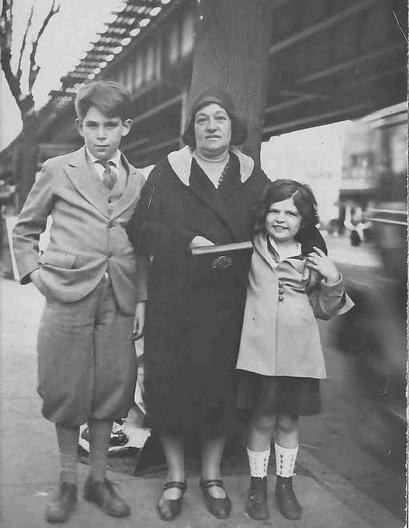
in favor of joyous pluralism. In my grandmother’s recollections of mixed dancing at her local community center, there’s a wildness that resonates with the rave culture where this track now lives To me, the pulsing beats and flashing lights of the rave are not so different from the energy she describes.
Layered into this track is a 1965 recording by Yiddish song pioneer Ethel Raim and her group “The Pennywhistlers ” Their song “OYFN OYVN” tells a playful tale of a girl and a boy on an oven an encounter charged with desire and sexuality. The girl says, “I won’t ask you where you’re from; I won’t tie you with rope, but I will embrace you, and I will love you, and you will remain ” This story, one of love without force and regardless of background, stands in beautiful conjunction with my grandmother’s story of pluralistic identity in Borough Park. Ironically, modern popular renditions have censored all mentions of sex and free love
Through these samples, my work explores how Yiddish folklore and personal memory can be repurposed to serve as tools for contemporary cultural reclamation Integrating these ancestral voices into techno is not just a musical project Rather, it’s a political project of diasporism, activating spaces where history, culture, and liberation intersect. By bringing these voices into modern, communal spaces, I aim to transform collective memories into shared experience, emphasizing the joy of engaging in fluid community and solidarity in diaspora.
Listen to “Borough Park” by Chaia, available on all streaming platforms
For more info and updates, follow Chaia on Instagram @chaialeh, find her website chaia.online, or email her at chaialehmusic@gmail.com to be added to her email list
Cover art for Chaia's new single "Borough Park " Chaia's grandmother stands on the far right, next to Chaia's great-grandmother and great-uncle
Vilna Goles
To be in solidarity with another is to put yourself at risk Practices of solidarity require us to radically question the social identities we have acquired as citizens of nationstates. While the nation-state offers the bond of fraternity a kinship limited to one’s “people” solidarity upends these borders of the Self by radically challenging who is inside and who is outside the national territories that traditionally define the limits of the Political. To be in solidarity is to recognize the exiles that we all are
The Vilna Goles are a loose group of jewish comrades Some of us live in contemporary Vilnius where we are doing our best to summon the spirits of the anti-authoritarian, internationalist, jewish and working class legacies of the city's past
Anti-Zionism, for us Goles(1), is more than an opposition to the forms of belonging that Zionism imposes it is its own practice of community Agamben’s brief article “The End of Judaism,” drawing from a study by Amnon RazKrakotzkin, helps us to shed light on this basic fact. We, the Goles, the exiles of Vilna, are at home in our affirmation that no state can be our home nor the proper home of humanity
Our historic exile following the destruction of the ancient kingdoms, was redeemed not through a return to those lands, but by the transformation of exile-asloss into exile-as-life. Goles, a people formed in exile, scattered about the world, turned the pain of exile into the joy and horizon of a dispersed and stateless humanity
The rupturing of the walls of socalled contemporary Jewish identity, by the Palestinian revolutionary tradition has urged new possibilities of belonging to this exilic life-world. For some of us this is yidishkeyt: the world of exilic jewish existence. Like other exilic forms of life, yidishkeyt, if an identity at all, is existentially precarious at its core a contested domain of meaning, which prioritizes a living ethics over any recourse to the moral dogmatisms implied in a return to authentic being
Yet let us be clear that our exile, with its joys, its pains, and its horizons, can't be consolation or far worse, justification for the horrors of Palestinians' displacement and genocidal erasure today As one Gole wisely observed in 1947, to face the future is to accept that “if there is no tikun, no redemption for mankind, then there is no redemption for the Jews.”(2)
Indeed, while Agamben’s focus here remains on Zionism’s radical negation of Judaism as a cultural and social form, we must not let this shadow the other negations Zionism perpetrates today Namely, the unthinkable atrocities the Zionist state wages against the Palestinians perhaps the exemplary subjects of exile in our own time
Our priorities are clear. As the jewish Goles, we turn toward the Palestinian Ghurba the Palestinian concept of exile for orientation in facing the future And what is this guidance and future? If our jewish belonging as
Goles, now faces near complete erasure in the aftermaths of the Nazi and Zionist imperatives, the Ghurba are the contemporary inheritors of the movement of resistance and belonging of a life-world shared with our historical people the life-world of exiled humanity.
From a condition of disorientation, of almost complete destitution, that has come as the consequence of over a century of our exilic peoples dismantling, we turn toward the Ghurba for what will be a difficult journey of return A return that, as Edward Said put, will not be an originating exile’s negation but a beginning again, a rebuilding together, in the here and now The Palestinian movement of return “evades purity” and “rejects totality,” as Adam Hajyahia writes; it is not “a negative desire for something they lack [...] but a redeeming principle that pursues the abolition of the conditions that render exile the only remaining possibility.” (3)
Finally, let us see this return in opposition to the impoverished politics of nation-states that have brought us to where we are today a politics founded on the fundamental division between the humanity of the citizen and the subhumanity of the exile While we cannot deny the debated question of what path Palestinian justice will take the nation-state is certainly present we can surely find in the widely rooted ways of life of the Palestinian people a movement oriented toward the destruction of walls: practices of dwelling against the state-forms logic of originating, enclosing, and owning.

SAM HIRSHBERG ןטסידנוב תורוד [Doyres Bundistn] was edited by the Bundist Jacob Sholem Hertz, who published many books about the history of the General Jewish Labor Bund These three volumes contain over 500 short biographical entries about rank-and-file Bundists by various authors.
The Bundist term for an activist, “tuer” (lit. ‘do-er’), placed an emphasis on what one did over one’s formal position in the movement, so it is no surprise that this chronicle of tuers includes both prominent personages such as Pati Kremer and relatively unknown organizers who nonetheless dedicated their lives to the movement These biographies vary in length and style, but they all provide insights into the history of the Bund and its organizing, as well as how the Bund functioned from a bottom-up perspective
This edition includes entries on Rashel Abel, Dr Berl Fridman, and Shiye Goldvasser, all contained in the third volume, which has been digitized by the Yiddish Book Center The stories conveyed in these short biographies help to illuminate the Bund’s complex political position during the early 20th century, from Fridman’s fight for national cultural autonomy in AustriaHungary to Goldvasser’s anecdote about street fighting with communists
I began this project because it is deeply important to me that as we seek to learn from the history of the Bund, we remember not just the lives of the Henryk Erlichs and Vladimir Medems of the world, but the rank-and-file tuers who smuggled books, hosted illegal gatherings in their homes, wrote songs, and raised funds for the Bund, often at great personal risk
Rashel Abel
Of her 46-year life, she gave 33 years to the movement – the Bund At the age of 12, she already stood in the ranks of the Klayn Bund A few years later, she took part in the professional movement and became a member of the professional administration of illegal garment workers’ unions in Vilna At the same time, she took an active part in party activities, spread literature, hid weapons, and organized Bundist gatherings
For the 10-year anniversary of the Bund in 1907, an illegal celebration was arranged in the Govogrodne suburb of Vilna, Lithuania This was disguised as an engagement celebration: the “groom” was A Litvak and the “bride” –Rashel Abel
In the time of the German occupation during the First World War, she was active in building kitchens and tea halls for the unemployed. In independent Poland, she was one of the founders of the Society of Jewish WorkingWomen YAF. Until the end of her life, she was in the leadership of the organization. At the same time, she devoted a great deal of effort to supporting the children in the Yiddish secular schools.
Rashel Abel died in the month of July 1936. A large crowd attended her funeral There were speeches at her grave by the Bundist tuers Ane Rozental, Yosef Aronovitsh, and Berl Vidman The crowd bid her farewell by singing the Bundist Shvue and the Internationale, joined by her orphaned daughters, the Tsukunft member Khaya and the SKIF member Hinde
Entry written by: Y Antokolski, Doyres Bundistn V3 P 454-455
Dr. Berl Fridman
Born in the village Seret, in Bukovina, to frum [religious] Hasidic parents He was sent away to a Yeshiva and was expected to grow up to become a Rabbi When the 18-yearold bocher [young, unmarried male religious student] made a “revolution” and ran away from the Yeshiva, he didn’t know how to read or write, except loshn koydesh [Hebrew] For several years he labored hard, literally starving, until he took the Matura-Exam in a gymnasium and went away to a Vienna university to study law Later, he became active in the socialist movement
In the First World War, Fridman was an officer in the Austrian Army After the war, he opened a law office in Czernowitz He had by then already become known as a tuer in the Jewish worker’s movement – in the Jewish SocialDemocratic Party of Galicia and Bukovina (ZPS), and later became one of the most important tuers in the Bundist organization, which was built up after the war in Bukovina and later in other parts of Romania
In Bukovina after the First World War, a Jewish NationalCouncil was formed, which was recognized by the Kingdom as the public-legal representation of the Bukovina Jews and received royal functions in the area of the royal schoolsystem. Fridman was one of the vice-presidents of the National-Council and the strongest driving force in the pursuit of transforming the National-Council into a permanent institution of national-cultural autonomy for the Bukovina Jews
When the Bund had built up its cultural institutions, Fridman set aside his role as the head of the large organization ‘Morgenroyt’ and kept the function of a chairman for a period of years (later comrade Wilhelm Ipen, who ended his life in exile in Siberia, took his position) When the Bund won a great victory in the Kehilla election in Czernowitz, Fridman became the chair of the Bundist faction, and as such, he was selected as the vice-president of the Czernowitz Kehilla
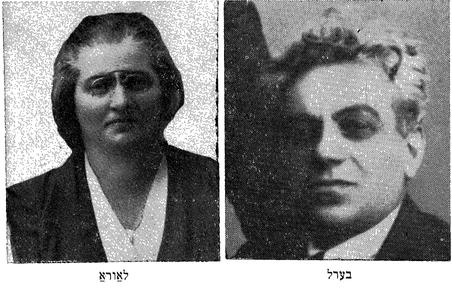
During the years when the ‘Greater Romanian’ Kingdom existed, between the First and the Second World War, Fridman stood in the front ranks of the Bund. With his sympathetic outward appearance, with his boiling-hot temperament, with his sharp and clever folk-sayings, he was a distinguished type of folk intellectual Beloved and revered by comrades and friends and highly regarded even by party-opponents, he was one of the best representatives of the Bund in all political actions and in all party institutions His home – the “House Fridman” – had a name as the most hospitable house for young and old from the socialist movement, but especially for the youth, because at home Fridman himself raised a ‘cell’ of the youthorganization, two girls and two boys, who followed in the path of their parents His wife, the comrade Laura Fridman, always received the young friends of her children with the warmest motherly hospitality
In 1933, when Romania began its openly fascist course, an especially hard time began for the Fridman family It was no longer possible for the Bund or for the socialist movement in general to act openly
The Romanization of the courts was led with an iron fist, and the lawyer Fridman, who had not learned the Romanian language well enough, was unable to work in his profession for some years under the new course. Moreover, his youngest son, at the age of 16, had already become acquainted with the Romanian “Siguranța” (political police) and with Romanian prisons, and under these circumstances he was forced to abandon Czernowitz
In 1934, the Fridmans moved over to Bucharest The “House Fridman” fell silent and withdrew from open activities, but, of course, it remained a socialist home Bukovina comrades knew the address whenever they came to Bucharest
Fridman’s older son, Max, who served in the Romanian army in the Artillery, went to join the Republican army in Spain during the civil war and went missing there It is unknown what became of him His daughter, Beate, is a talented actress of the Romanian stage In the difficult times of fascist Romania, they allowed her to perform theater for a short time, but exclusively for Jewish audiences
Dr Berl Fridman was about 70 years old when he died in Bucharest, in the year 1941 His wife Laura died in Bucharest a�er the Second World War
Written by Dr. Y. Kisman, Doyres Bundistn V3
P. 250-251
Born in the year 1905 in Bialobzheg, Radomer Governorate, Russian-Poland – shot by the Nazis in 1942 in the Warsaw prison Pavyak His father was a poor master-cra�sman Shiye’s childhood years were full of hardship In the early 20s he came to Warsaw, where his older brothers, Bundists, already lived, in order to learn a trade and receive a little education He had to make difficult efforts to get bread and knowledge He became a member of the Youth-Bund Tsukun� and became active in it.
Shiye had uninterrupted contact with his home-town and o�en went home, where he helped to build and strengthen the Bundist movement. As in Warsaw, in Bialobzheg he remained in active struggle with the communists, who were not picky in their means of struggle against the Bund and all its branches. In 1936, communists attacked him in Bialobzheg and beat him so badly that it le� him deaf.
In 1939, when the Second World War broke out, Shiye together with his older brother Kopl fled with the flow of refugees from Warsaw They went to Baranovitsh Finally, the Bolshevik terror regarding the refugees sent both back to Warsaw to their wives, children, and elderly parents In Warsaw, under the murderous Nazi regime, they survived all the pain of the Jewish people Both brothers worked as tailors in the Warsaw prison Pavyak
Shiye knew every day when he went home and in the morning that he had to go back to provide work. The committee of the underground organization of the Bund took advantage of this, in order to keep in contact with the Bundists who had been arrested in Pavyak or to send something past the prison guards to them. In 1942, both brothers Goldvasser together with a group of Jews were taken to the courtyard of Pavyak and shot there
Written by Ben Shlomo, Doyres Bundistn V3 P. 457
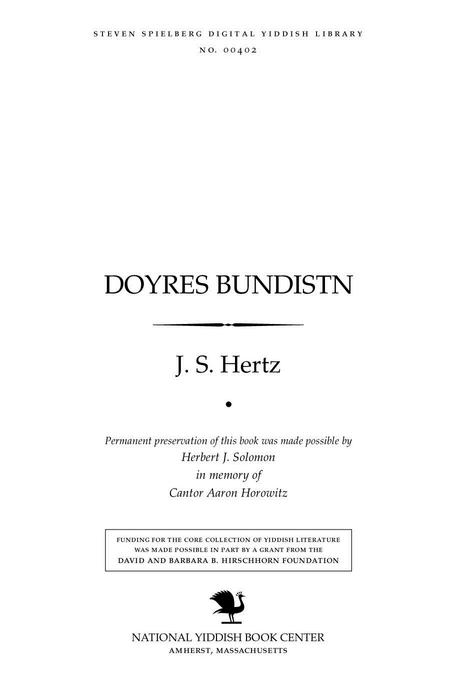
Sam Hirshberg (he/they) is a 4th year undergraduate at UC Berkeley studying History and Political Science He is currently writing his thesis on the Bund in Berlin
Joe Grim Feinberg
The sun rises black, the day rains lead, but the night is lit with fire
The howling Lord of Hosts won’t hear the hails of peace, his ears are shot and broken
What good are all your mitzvahs when you slither and hiss between them?
The shine of your city, we see, comes from the pupils of red-eyed fiends, a covenant of miscreants become a burning fascicle of thieves
You march toward enemies, you think, but your boots sink down to the pits of Sheol rejoicing at your coming, you chase the enemy, you think, you drive him down below, you think, the worms themselves will flee, you think, but there is no enemy, you march down your own path alone, greeted only by worms
Above, the masters of surveillance can’t see the orphans or the parents, their cameras are pointed into their own behinds
You think the enemy is writhing in pangs of death, but those are birth travails, it’s you who writhe inside, you drained your soul like you drained swamps, and only desert then remained
You think you make a desolation of the earth, but you yourself dissolve
You think you win by making people scarcer than fine gold, but every piece destroyed just makes the price go up, life once cost only a bullet, then it cost an army, then the price was one whole people, and still you pay and pay.
Nations disassemble in your mountains and in the plains below, and you, grand disassembler unmake yourself
When you made yourself a nation, the oracles against the nations came to you
Glory of kingdoms, joy of tourist folk, proud dancer on the missile fire, singer of startup hymns, you’ll soon be overturned like Babylon.
Magpies will flutter through the mansions, satyrs leap over the highways, lions break down all the checkpoints Jackals already have overrun the castle, and the pleasure pits breath dragon fire from their cracking screens.
An uproar sounded from the dead who will not return, not even at the end of days, because there will be no end of days, because, maybe, they’re already past their end, but nobody knew
Do the worms and maggots crawl still, do the waters on the beach still pound, the pines and cedars rise above the bombs? Are cities there still lying under ruins?
Let it be the earth that howls now and shakes until its buried cities rise up from the sand ◈
by Lorie Shaull
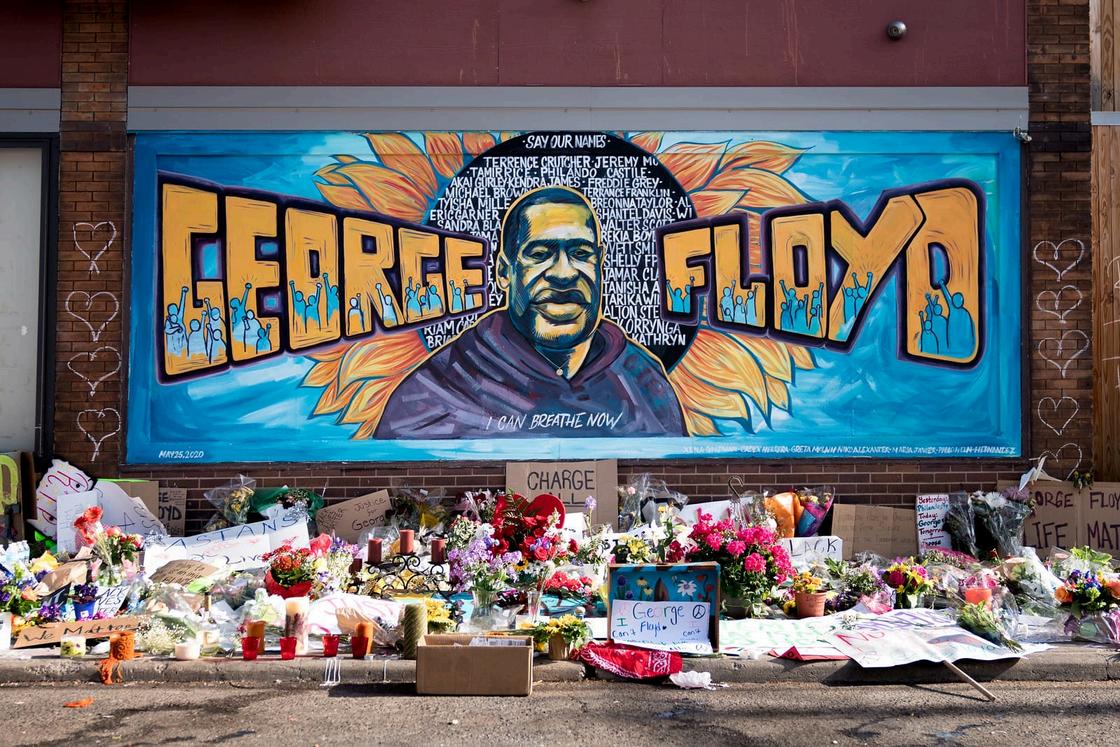
JOSH WALETZKY
I was moved to write der talyen/ The Hangman while watching Al Sharpton eulogize George Floyd at the June 4, 2020 memorial in Minneapolis Sharpton emphasized the horrific symbolism of Floyd's murder the “knee on our neck,” which has for so long held down and held back Black people in this country At the same time, Sharpton welcomed the heartening fact of widespread, multi-racial demonstrations of outrage around the nation and around the world I wrote the song in Yiddish because Yiddish has become my first songwriting idiom and a language that invokes a long tradition of moral, social, and political critique
I tell the story in four verses, each actor paired with the authority they answered to: the cop-executioner, who obeys his commander-in-chief (then-President Trump); the junior cop, who writes up the death report according to his superior officers' implicit behest; the eyewitness who captures the truth on her cell phone, who obeys the moral imperative to bear witness; and the world of mourners-protesters, who obey the moral imperative to “only just do justice ” The song is dedicated to George Floyd: koved zayn ondenk/honor to his memory
1. The hangman wore a sky blue shirt. And what does his overlord require of him?
To kneel, to kneel, and kneel, and kneel unto death
To kneel out of the captive all his life and right, to make it clear to all what is punishment and what is crime
The hangman wore a sky blue shirt
2. The underling went to sign off on the report.
And what does his superior require of him?
Falsehood, falsehood, falsehood, made-up stories
To write down that the captive resisted, because every sworn juror will accept it as good as gold.
The underling went to sign off on the report
3 The passerby was walking, and saw what was happening.
And what does the Most High require of her?
To be the witness, to be the witness to capture the truth with her telephone
To inscribe in our common conscience that undeniable, endless moment.
To tear the mask of law off of America.
The passerby was walking, and saw what was happening
4. From every home and community come streaming into the streets
mourners-resisters, in sorrow and in anger
And what does the Most High require of us?
“Just only to do justice ” Only to do justice.
No more “superior race” vs. “inferior race” handed down through generations!
No more “superior race” vs “inferior race” held in place by terror!
An end to the racist structures that torment us!
An end to lynch mobs that go wearing shirts of sky blue!
From every home and community come streaming into the streets
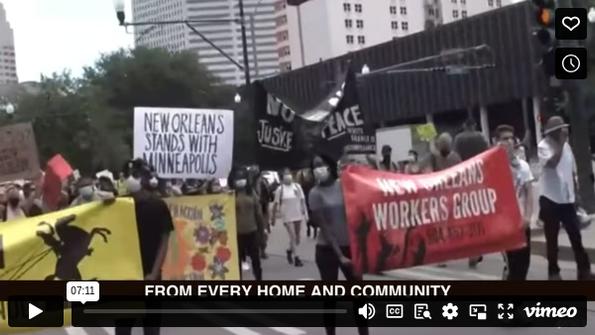
If the embedded video won’t play, you can watch it here.
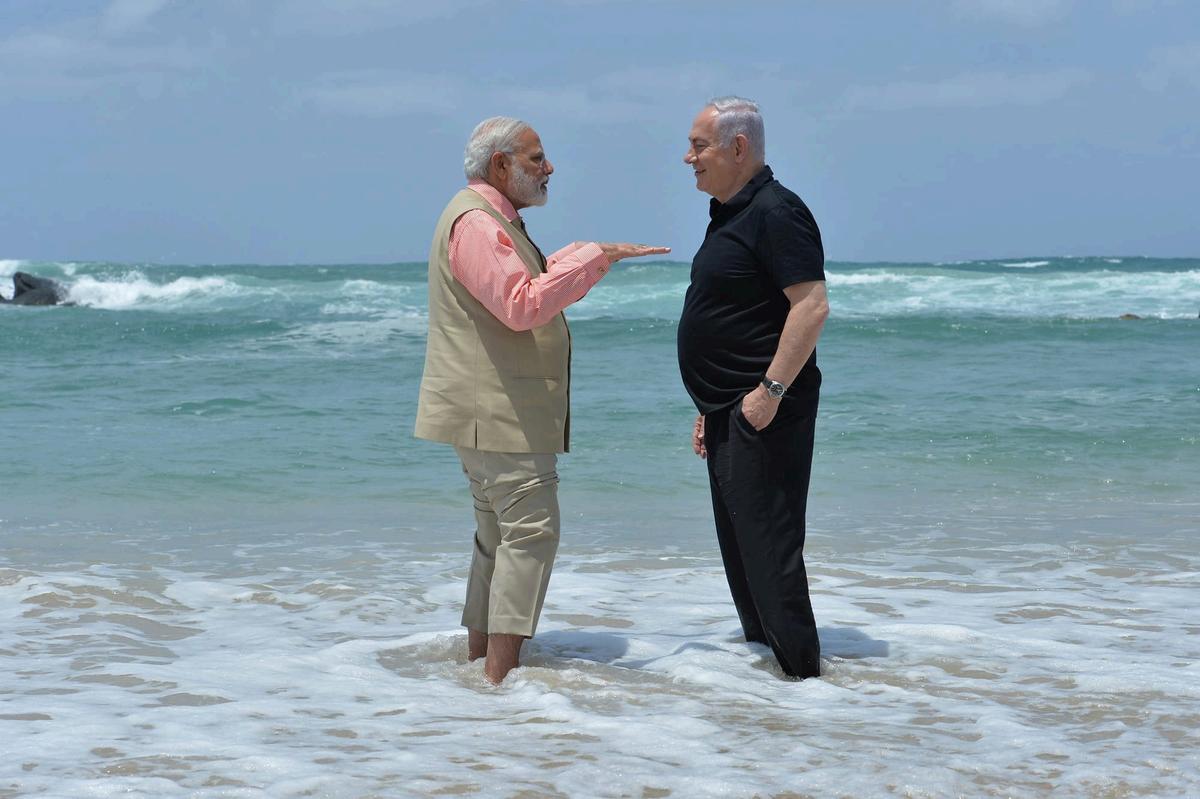
SHANTI SINGH
The Hindu-supremacist movement in the United States is a satellite of the project of Hindutva, an ethnonationalist movement that predates the simultaneous decolonization and violent partition of South Asia in 1947 It was one of many competing visions, socialist and fascist, radical and reactionary, theocratic and egalitarian alike, fighting for dominance in the subcontinent as the British Raj finally crumbled in the aftermath of World War II While Hindutva remains unknown to most Americans – including politicians who wittingly or unwittingly enable it – it is working to radicalize formerly apolitical Hindu South Asian-Americans in the diaspora by repurposing "model minority" meritocratic success in service
of anti-solidaristic domestic politics in the U S , as well as the muscular chauvinism exemplified by Indian Prime Minister Narendra Modi, his ruling Bharatiya Janata Party (BJP), and the BJP’s century-old paramilitary base-building movement, the Rashtriya Swayamsevak Sangh (RSS) By inculcating a sense of grievance in their base by suggesting that “HinduAmericans” are under attack by ethnicstudies curricula, affirmative action, anti-caste discrimination laws and other initiatives, Hindu nationalist groups in the US both weaponize the language of discrimination and xenophobia to appeal to liberalism while also preserving the model-minority image of Hindu South Asian-Americans as selfmade meritocrats to appeal to conservatism. Their approach to the issue of caste lays this incoherence bare
Like Zionism, Hindutva in the US is dependent on spinning revanchist historical myths for the diaspora while weaponizing the anti-discriminatory concept of "Hinduphobia" to keep liberals onside while stifling leftward criticism from the groups it seeks to marginalize, namely Sikhs, Muslims, and lower-caste Hindus Like Zionism, Hindutva is constituent to the twin projects of the "multiracial far right" within the United States and an emerging internationalist right-wing realignment that includes the repression of Palestinians and Indian Muslims. Perhaps that is why Hindu nationalist organizations, like the Hindu-American Foundation (HAF) which led the charge against SB 403 have partnered so seamlessly with Jewish Zionist organizations like the Anti-Defamation League and the American Jewish Committee.
The American ruling classes see the obvious geopolitical benefits in accommodating Hindu nationalist politics and looking the other way from a growing ethno-religious lobby in the United States whose interests align with the foreign policy incentives of American hegemony In 2023, thenPresident Biden rolled out the saffron carpet for Prime Minister Modi at a glitzy state dinner, attended by Democrats and Republicans alike who were more than willing to overlook the BJP’s intensifying repression of Sikhs, Muslims, and Dalits in order to buttress India’s role as a glittering success story of post-Cold War capitalist globalization and a geopolitical bulwark against China Under Modi, the Indian government has intensified a growing alignment with not just the US but its client state, Israel
As the Indian and Israeli governments grow ever closer, so do their American allies and deputies The invention of “Hinduphobia” has its most obvious parallels with the weaponization of antisemitism to stifle criticism of Israel and its conflation with anti-Zionism. Both are projects working to manipulate traditionally liberal identity politics in America to the benefit of an increasingly internationalist right wing. Like Zionism, Hindutva is rooted in and obsessed with narratives of indigeneity, intrusion, and colonization, rewriting millennia-long histories of a diverse and multiethnic region into a single narrative of a “Hindu people” who have been consistently oppressed by “foreign invaders,” including South Asians who have been Muslims for well over a thousand years (Recall the visitors to Afghan-American Aisha Wahab’s office, haranguing her staff with dubious history lessons about the Mughal Empire ) The Hindutva call for reclamation against what Modi himself has coined bara sau saal ki ghulami – “twelve hundred years of servitude” – clearly echoes Zionism and
many other ethnonationalist, historically revisionist narratives taking hold across the global right Just days after October 7, 2023, disinformation experts found that the top global source of false social media videos and claims about the attack was Hindu nationalists in India, and proIsrael posts from Hindu nationalists are common enough to be memed themselves.
The hostility of the MAGA base to South Asians is more naked and emboldened than in recent years, but it is hardly shocking that South Asians have become targets of oldfashioned American racism and nativism. No more surprising is the response from CEOs and tech oligarchs in defense of "high-skilled" immigration programs like the H1B visa, whose recipients' immigration status is tied to the whims and conditions set by their specific employer, making them targets of exploitation and resentment all at once – a social position long occupied by European Jews and characteristic of antisemitism’s role in refracting popular discontent Of course, not all South Asian immigrants, let alone second- and third-generation South Asian Americans, are white-collar workers with elite educational backgrounds, even if they continue to be stereotyped, glorified, and resented as such Are H-1B immigrants victims of nativist protectionism or potential agents of race and class division? Are they privileged members of the professional managerial class or part of an exploited labor underclass like many other immigrant groups? The real question that the H-1B discourse begs is not how South Asians in America are perceived by different political factions, but how they will choose to perceive themselves in response – and what politics will emerge from their choices This future remains in flux
In 1911, Har Dayal wrote to a Calcutta-based journal with radical optimism about the revolutionary energy he witnessed living among the diaspora. "At present, the people who live in India see only the dark thunder laden ominous clouds... but I have seen the silver lining which is invisible to them: I have found it in Europe and America, but mostly in the latter country... India is not dead but living. Much is being done abroad which is not known at home." Dayal envisioned diaspora as the vanguard of an internationalist movement, developed by and rooted in their experience abroad, that could advance the liberation of their motherland as well as their new land Perhaps his vision can be renewed
This is a condensed version of a longer essay by Shanti Singh, which you can read here
Resolution 1a. Whereas we have lived long enough in the world of our elders, as laid out in Appendix A, the book of Ungodly Psalms; whereas, moreover, we have grown tired of reading and living the fire and floods, the ruin, wandering, exile, ash and mud, etc ; be it here
Resolved that we will conspire against the abovementioned things To this end, we lay out the following plan for global insubordination:
first, in the margins of every holy book we will scribble dirty jokes and blasphemous curses, which, read backwards, will be acronyms for our dreams;
second, our dreams will creep without warning or permission into all your dreams; third, we will dub the sound of tears over the banal banter of your favorite sitcoms, we will put level-headed calls for reconciliation into the mouths of your action heroes, and we will angrily shout in the well-timed, somber pauses between your broadcasters’ heartfelt expressions of concern for the victims and the disadvantaged;
fourth, we will hang on every workplace wall a poster for vacation in a land that isn’t born; fifth, we will bite the skin of every businessman and civic leader, to leave an unmarked itch that has no place to scratch and will therefore send him running everywhere, looking for the cure; we will have the cure; in addition, we will make his children into poets and barefoot gazers at horizons, and, at age fifty-five, or upon his reaching the pinnacle of his career, whichever comes first, we will make him fall in love, with a slender shadow;
sixth, we will kick off a mass campaign to insert hope and light melancholy into your vaccines;
seventh, we will fan the smoke of forest fires into the shape of fists knocking on your penthouse office windows; we will divert the coming floods into canals that spell forbidden slogans when seen from the mountains above;
eighth and lastly, in every nation’s anthem we will slip hidden notes of “The Internationale” played on clarinet and accordion, tuned to the pitch of vendors’ calls and squealing trams, such that it will be heard only when the unsuspecting citizen steps out of her home and into the street
The plot will conjoin, but is not limited to, daughters of tenured philosophers, sons of yuppies born to hippies, student activists turned copywriters, aged 25 to 35, carbon-neutral brokers who fall asleep on the job, exploited employees of foreignfunded NGOs, gender ideologists, failing students, indebted graduates, neo-Marxist postmodern antiracists who have never seen an ordinary person in their lives, ordinary people, Jew-Bolshevik anti-Zionists, Zionist anti-Zionists, lapsed Trotskyists, anarchist leaders, sophisticated parcel sorters, economic immigrants and their enablers, sweatshop singers, café worker organizers, café-lounging radicals who drink espresso in Chicago and batch brew filter in Prague, yes, even the guys with thick-framed glasses and Marx-Engels beards and Haymarket moustaches, even they will join
In addition, there will be hunchbacked, long-nosed Jews, as well as blond, broad-shouldered Jews with sky-blue eyes, and black Jews, brown Jews, yellow Jews, all of whom are also red Jews, including even German Jews, Arab Jews, Mexican Jews, Chinese Jews, Indian Jews (both kinds of Indian),
Gypsy Jews, Vashti as well as Esther (we will not consult Mordechai), Teresh and Bigthan, Jews with class-struggle trust funds, schnorrers, Gentiles with class-struggle trust funds schnorrers with class-struggle pocket money, fake Jews and crypto-Jews, Jews still hiding in your attics and cellars, Jews hiding in your coat pockets and in the dust jackets of your books, Jews caught in your throat and hiding in your heart, dybbuks, and dead Jews, rising from incinerated bones and turned-up graves
Only Soros and the Rothschilds will face restriction, to be admitted on the sole condition that they assume false names
We suggest variations on “Red Shield” and “Schwarze Fahne,” but the decision is up to them
We will not even know when they have joined.
The oath of allegiance contains no words
You will never know when you have given it.
The secret handshake will be revealed to no one, least of all to the conspirators. Each must find it on their own
All in favor
All opposed No abstentions ◈
C O V E R A R T & F O R M A T T I N G
L A Y O U T D E S I G N
C O N S U L T A T I O N
